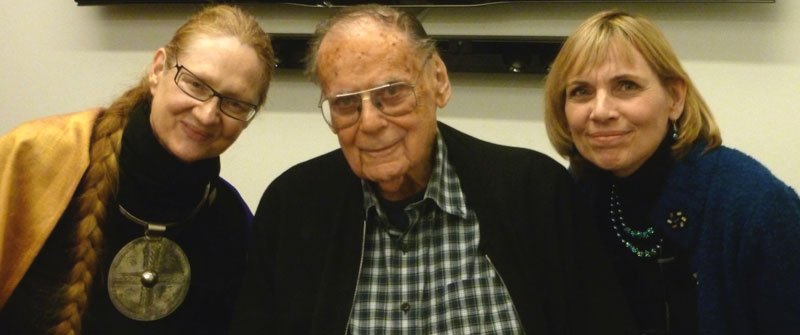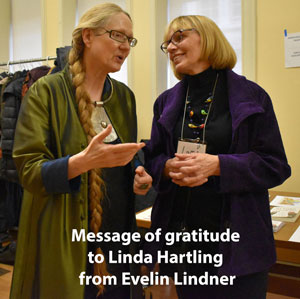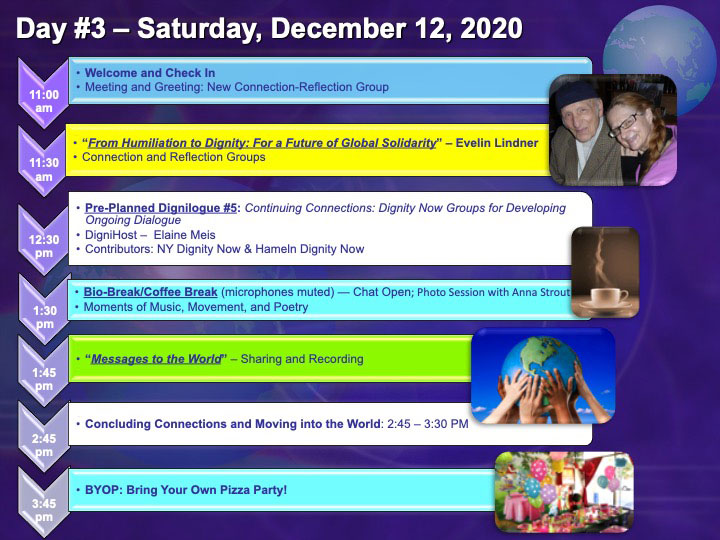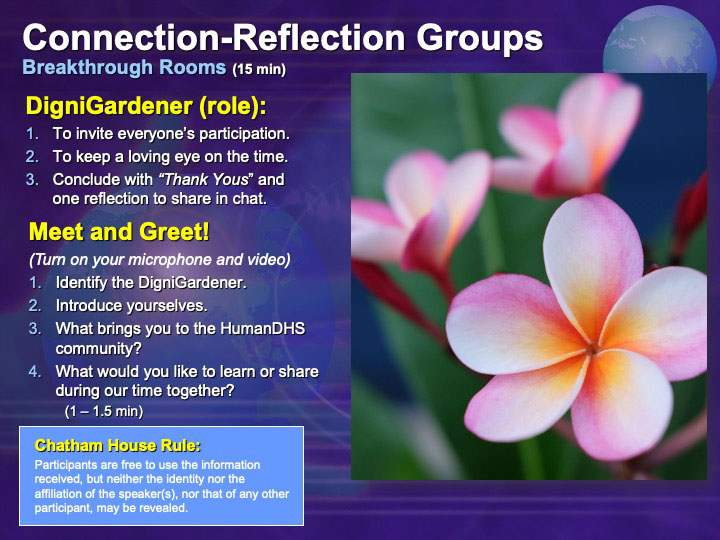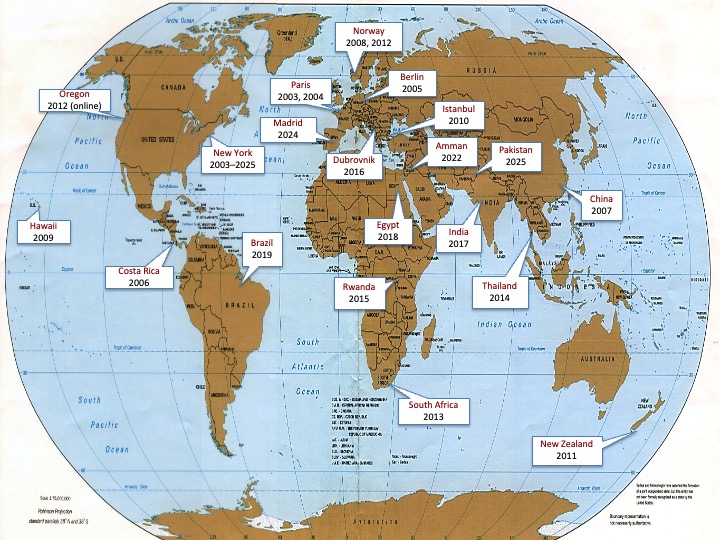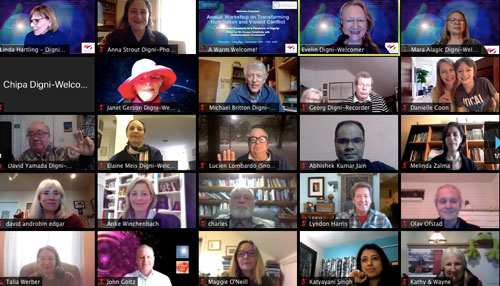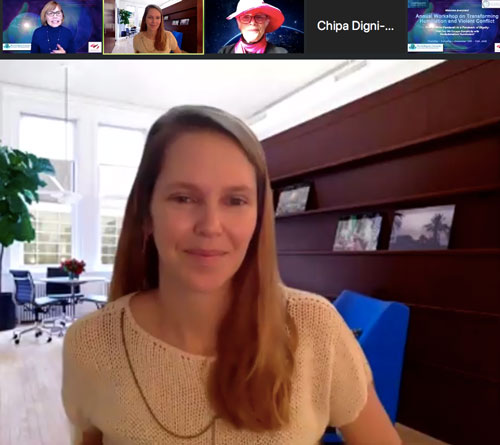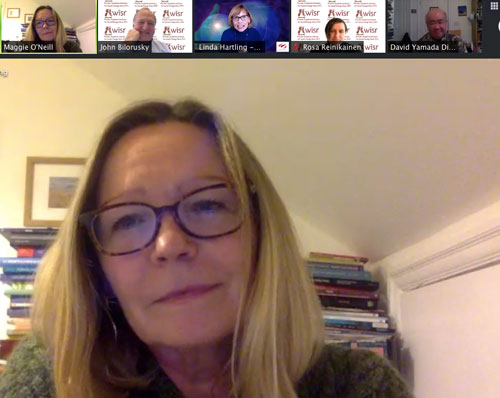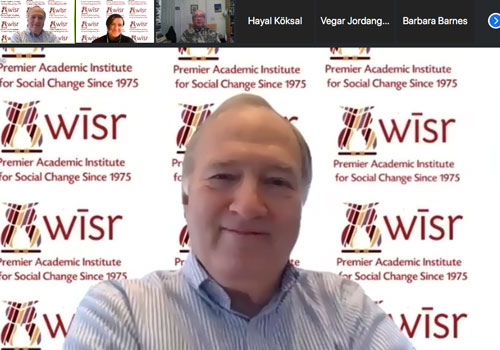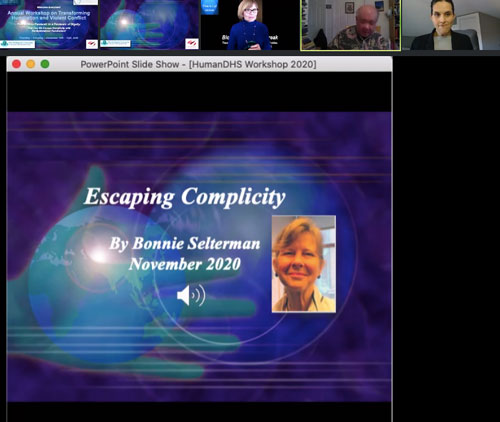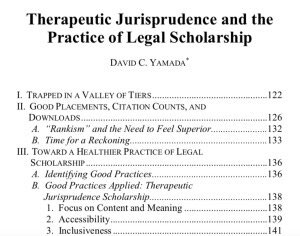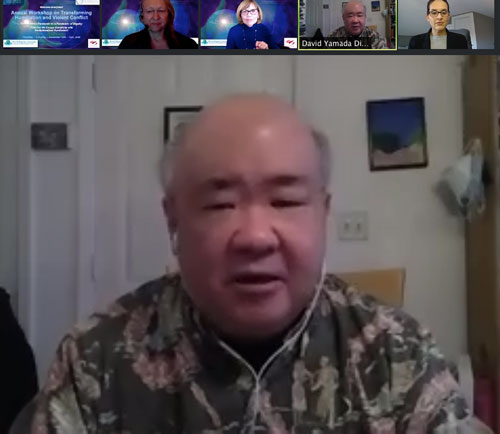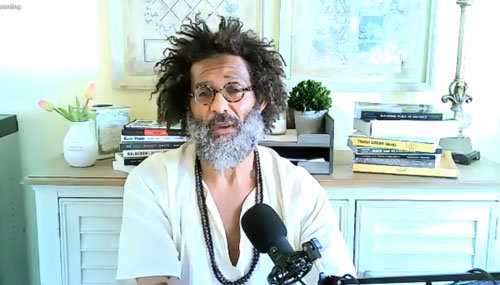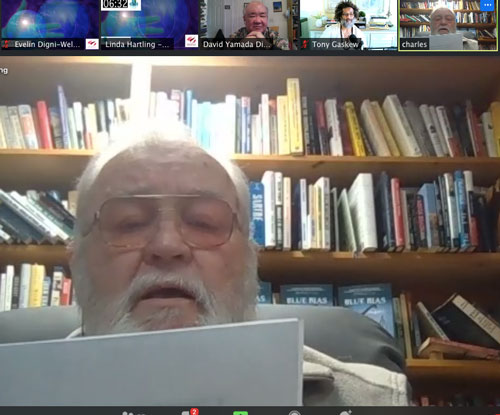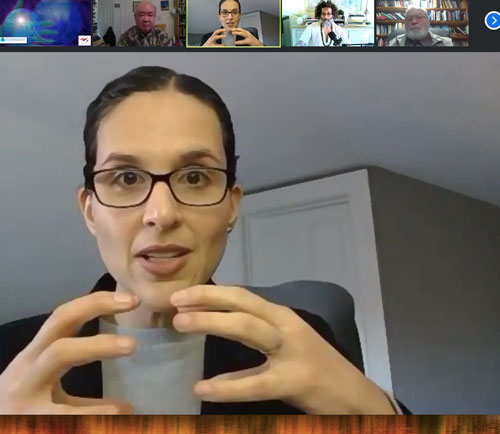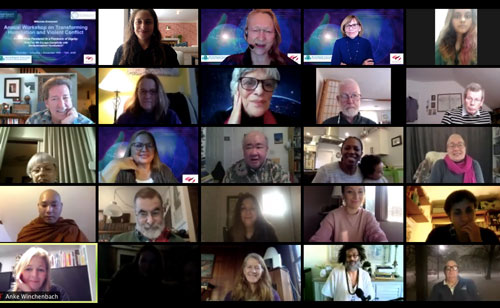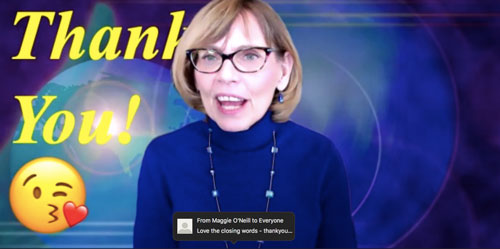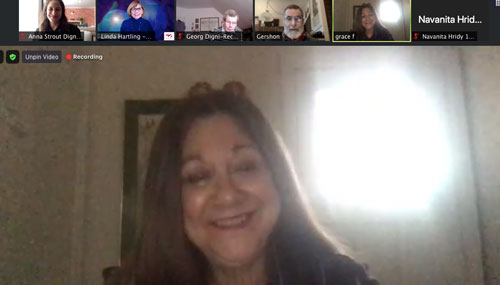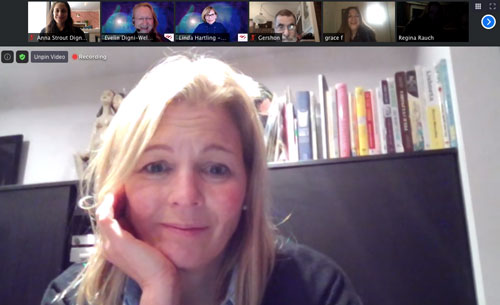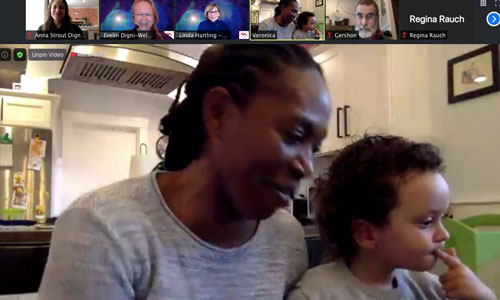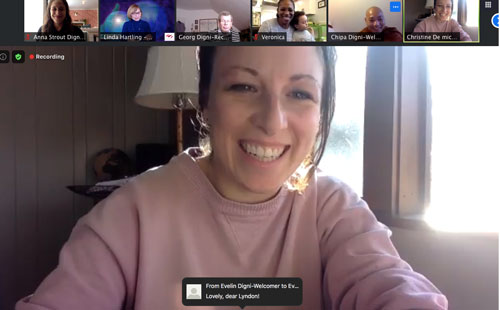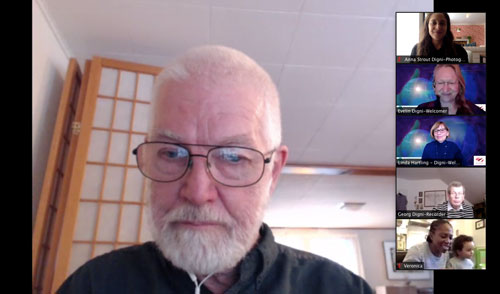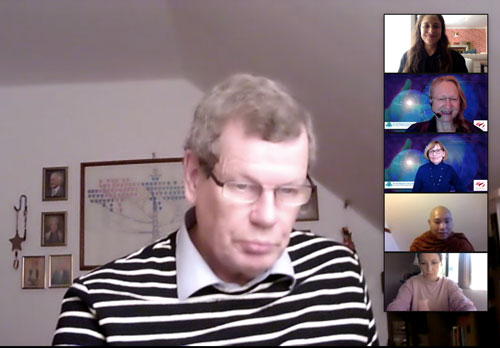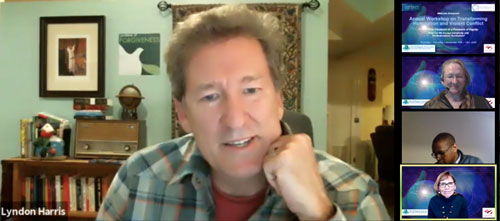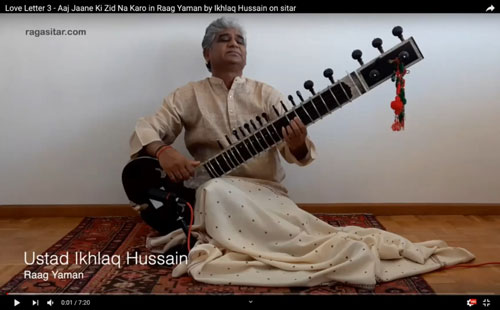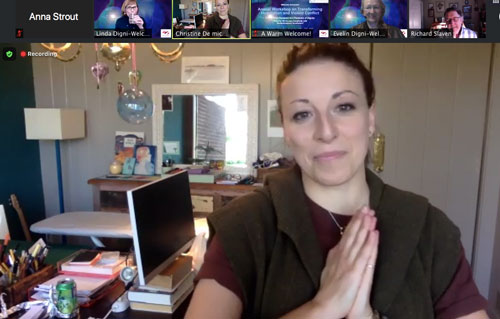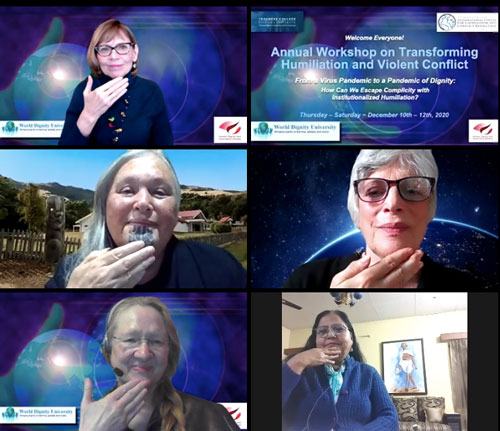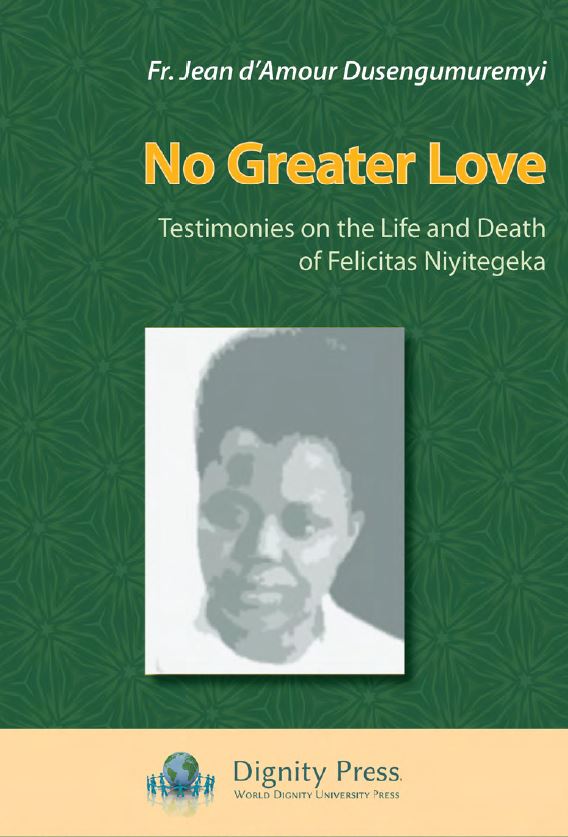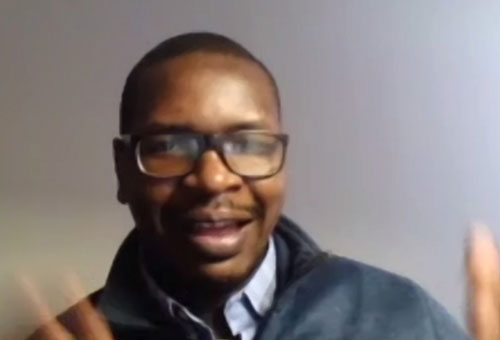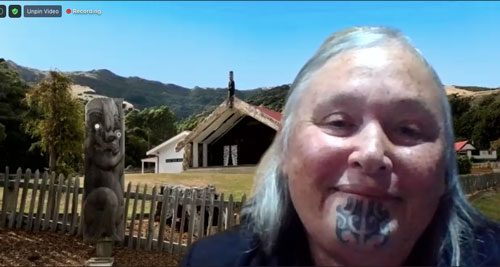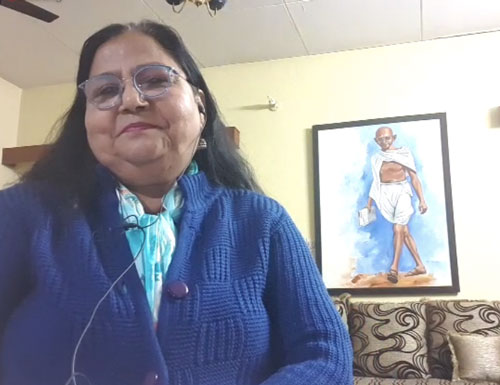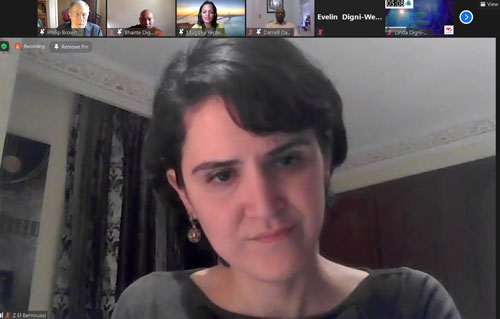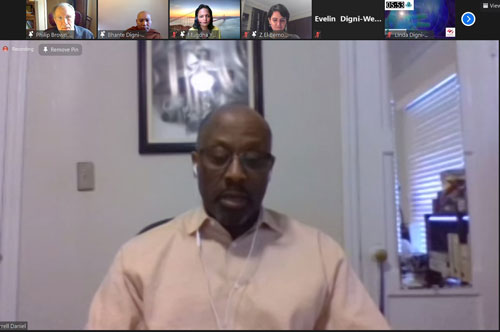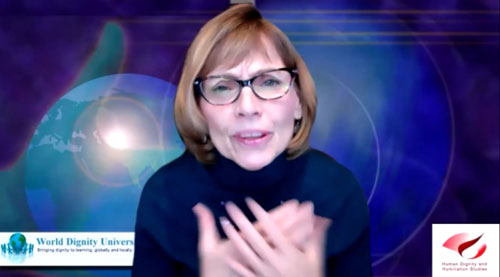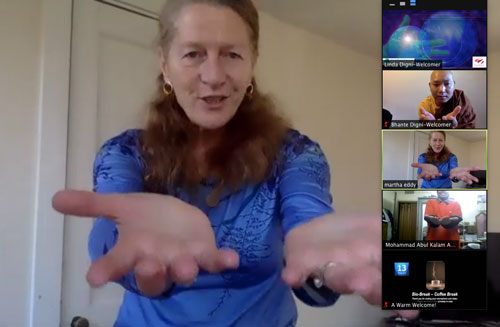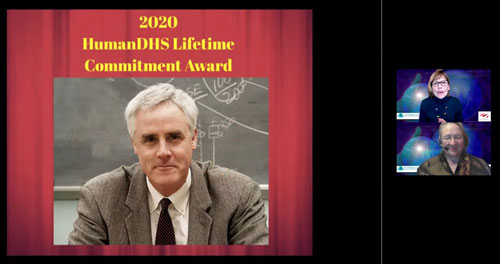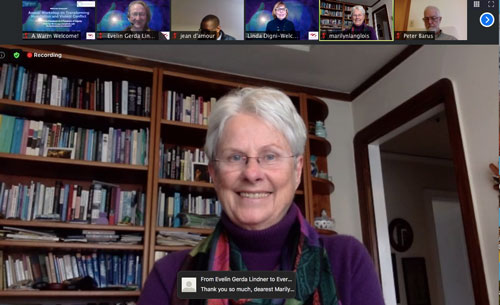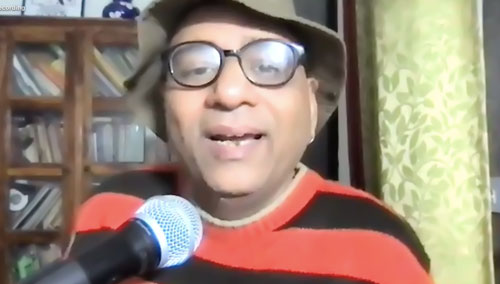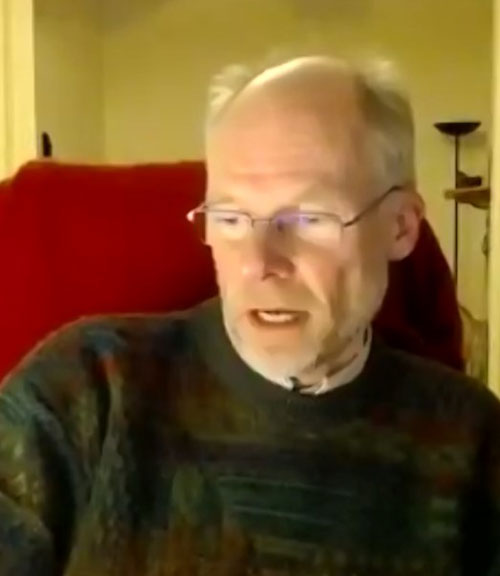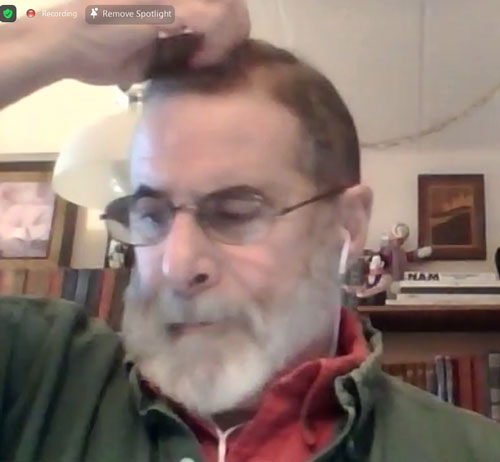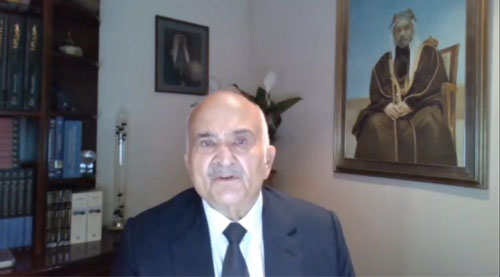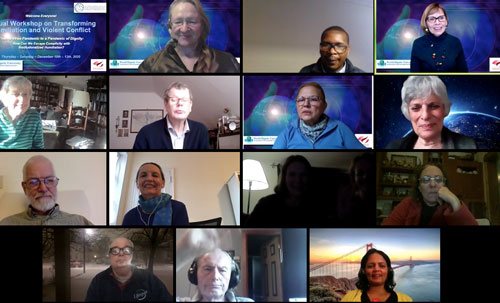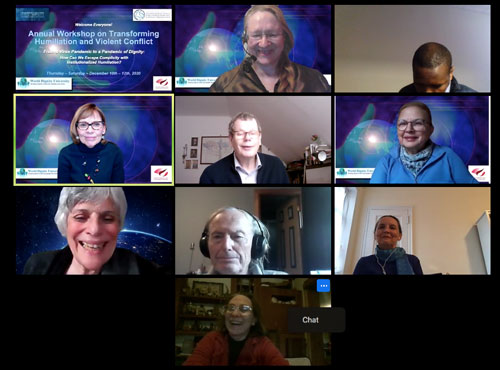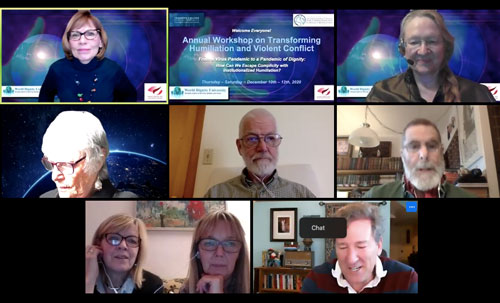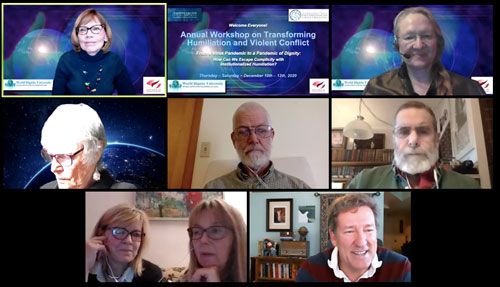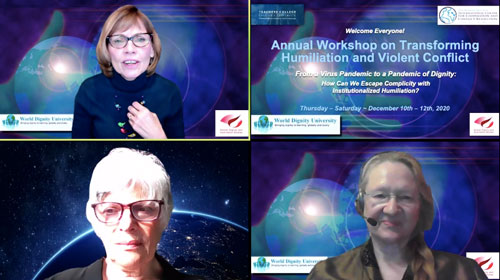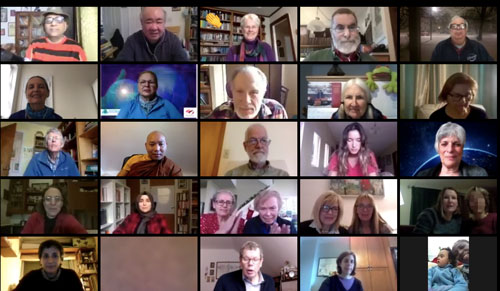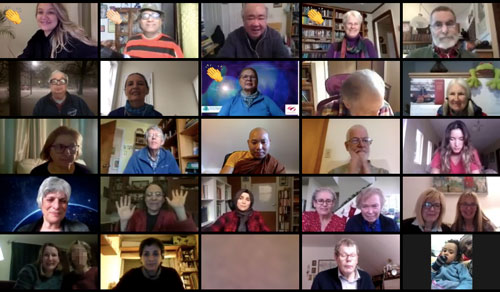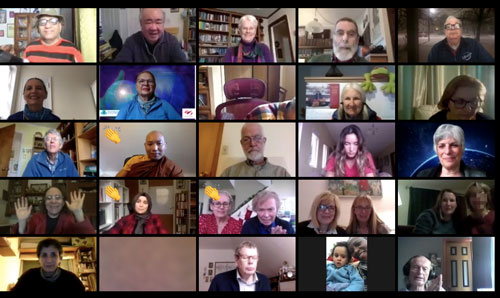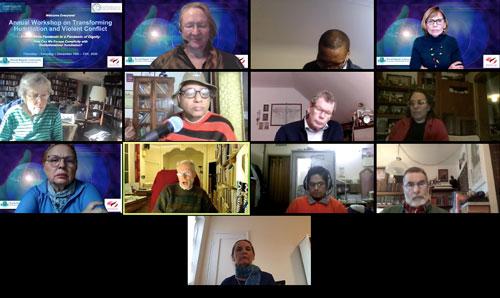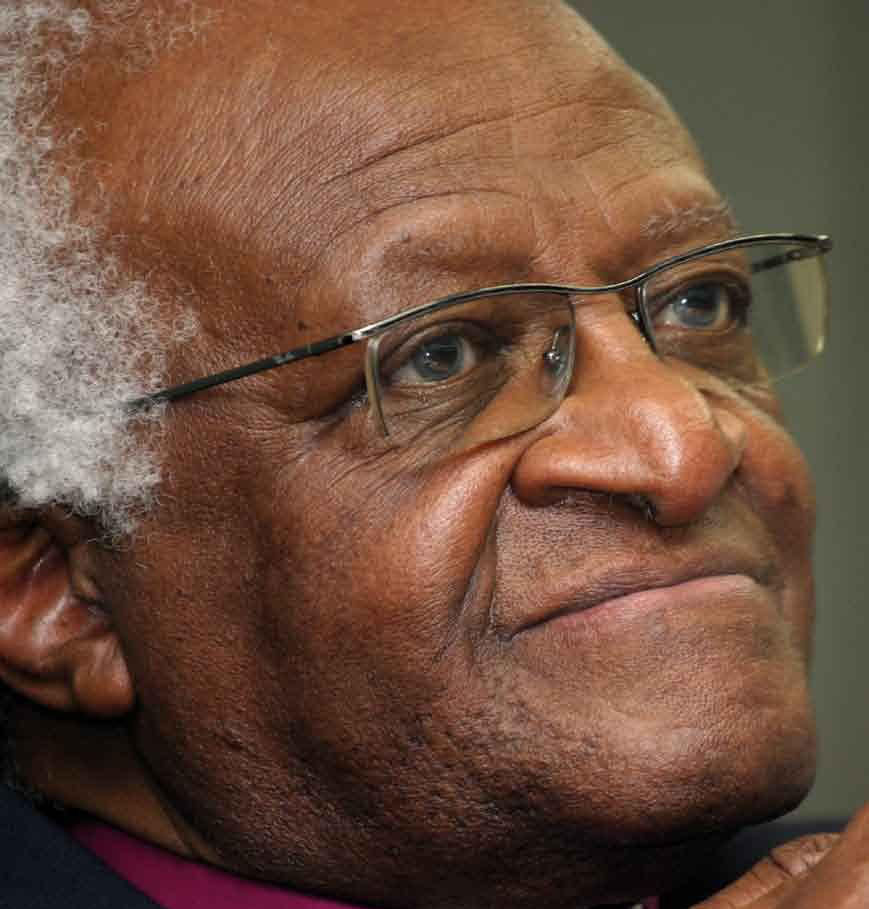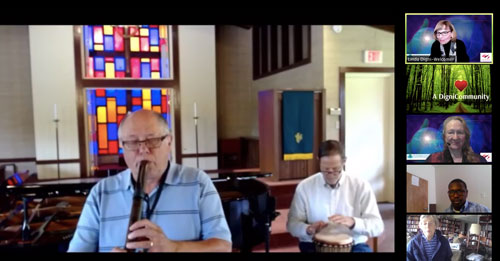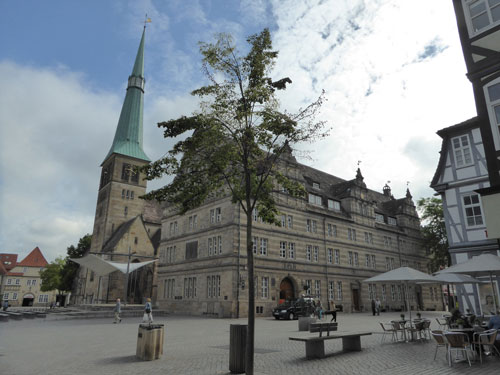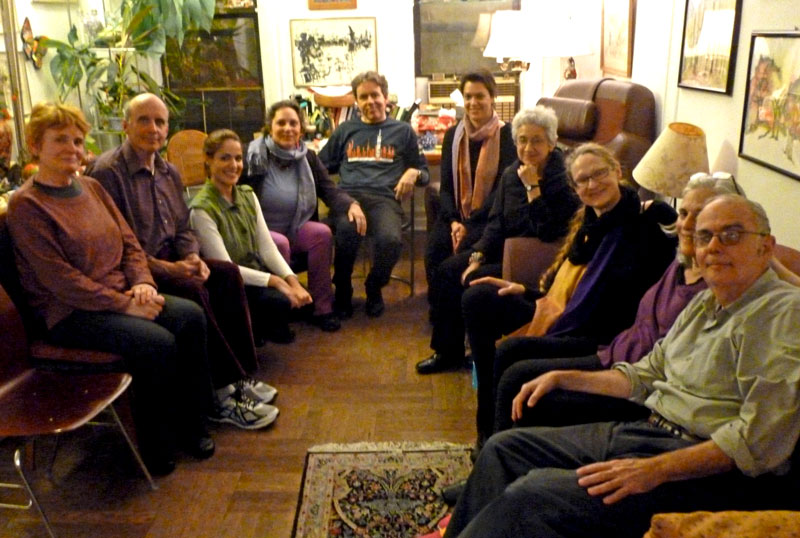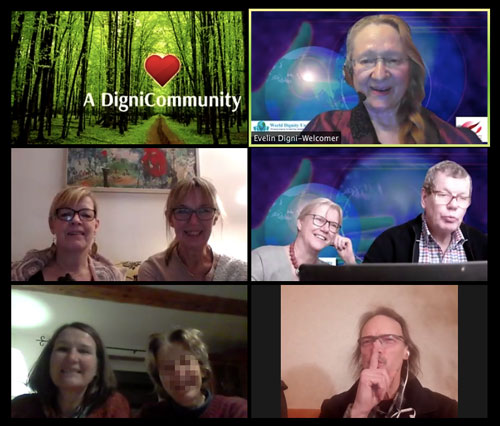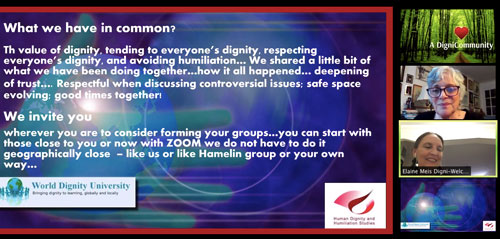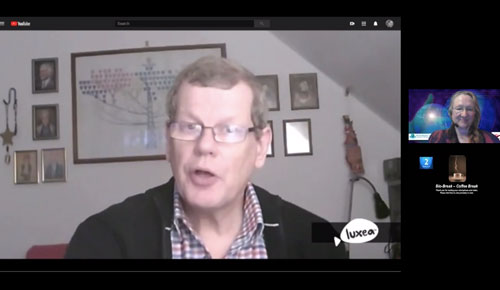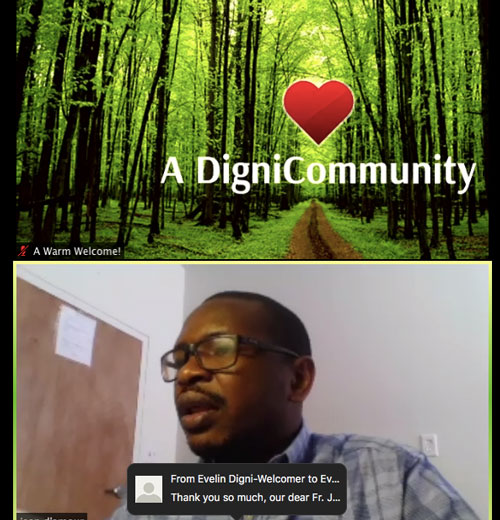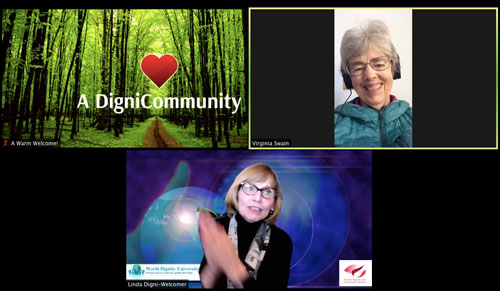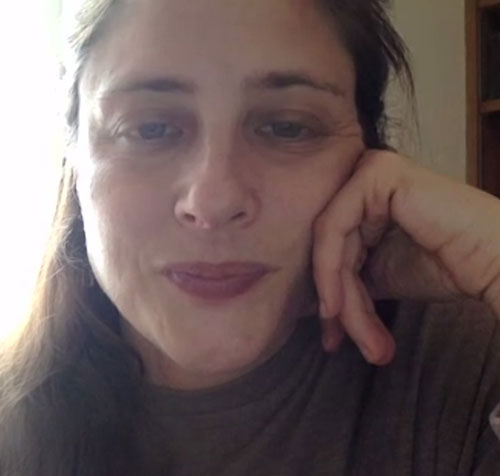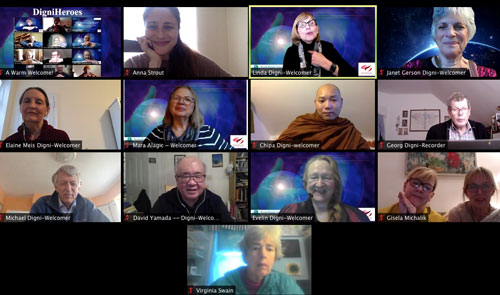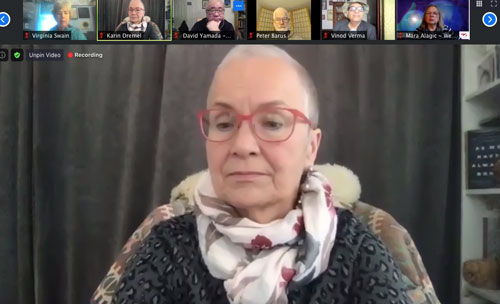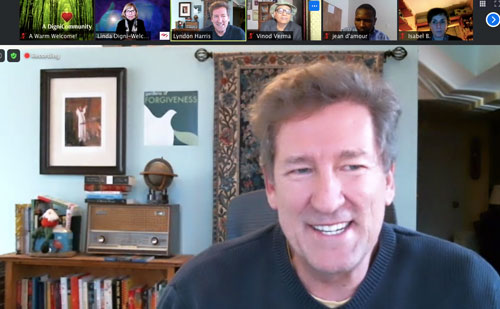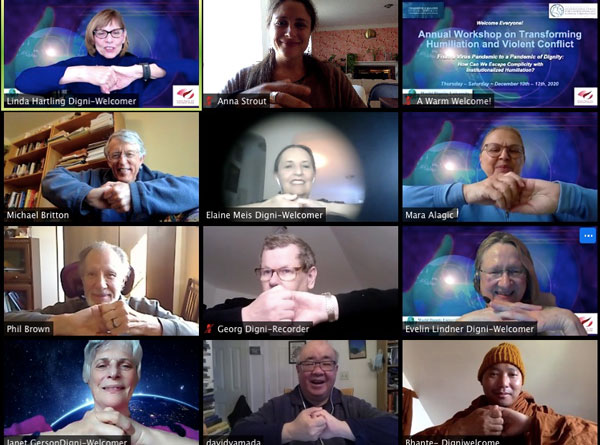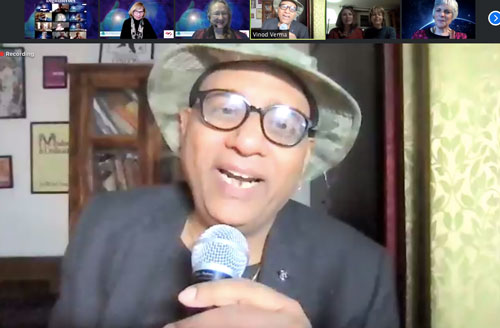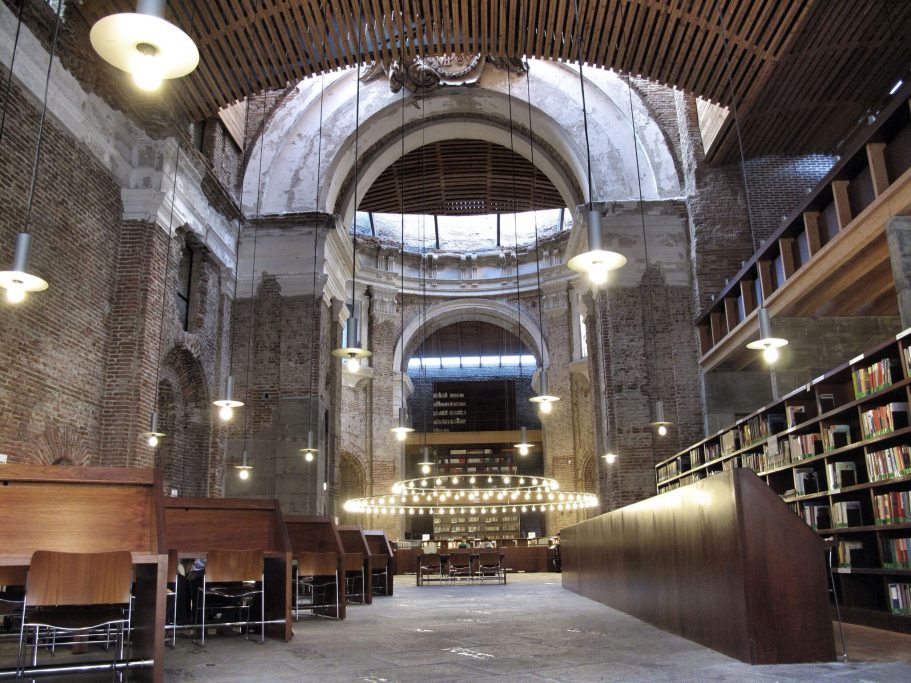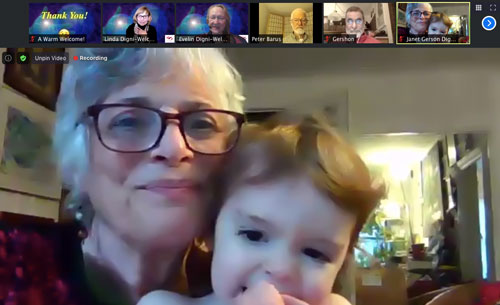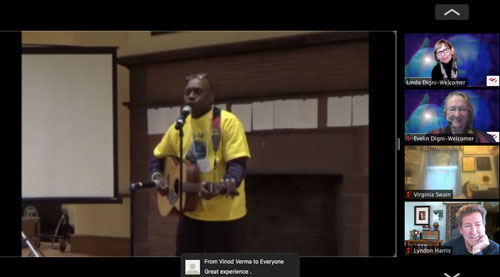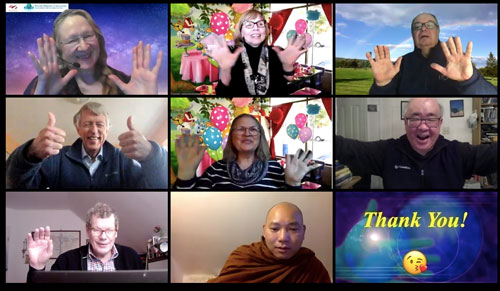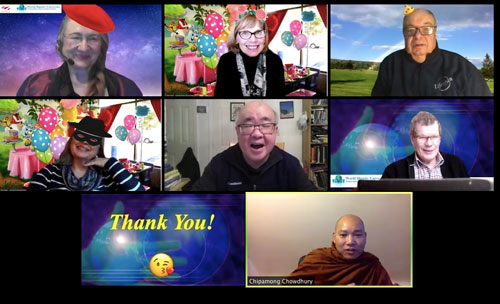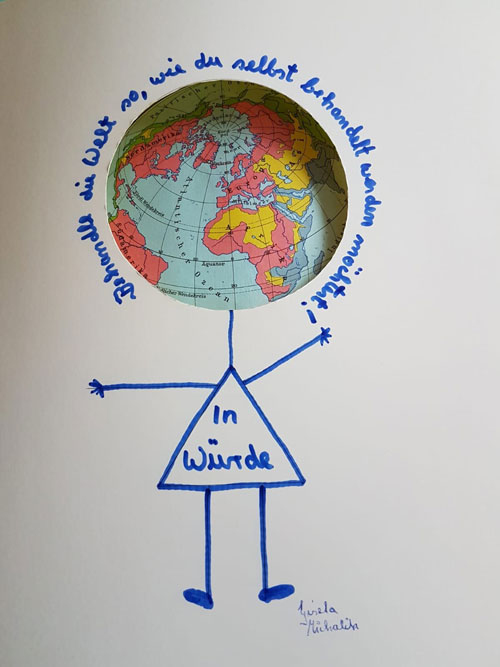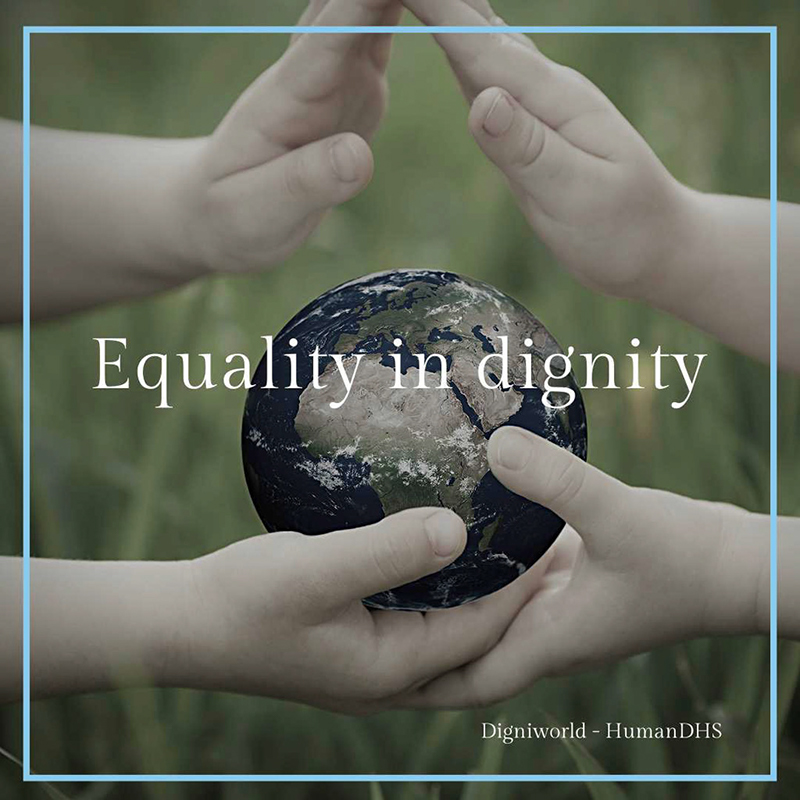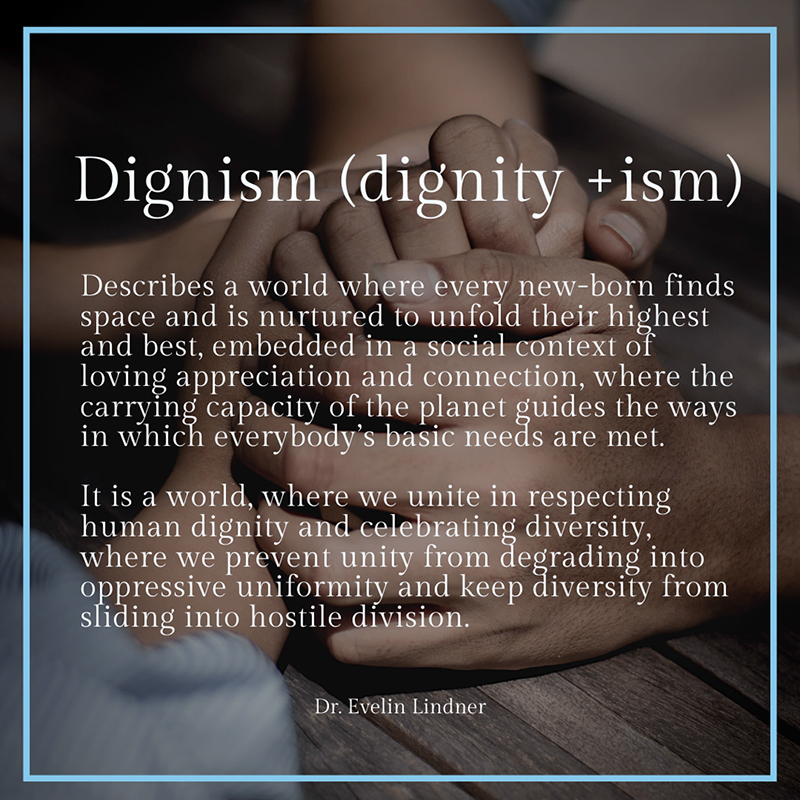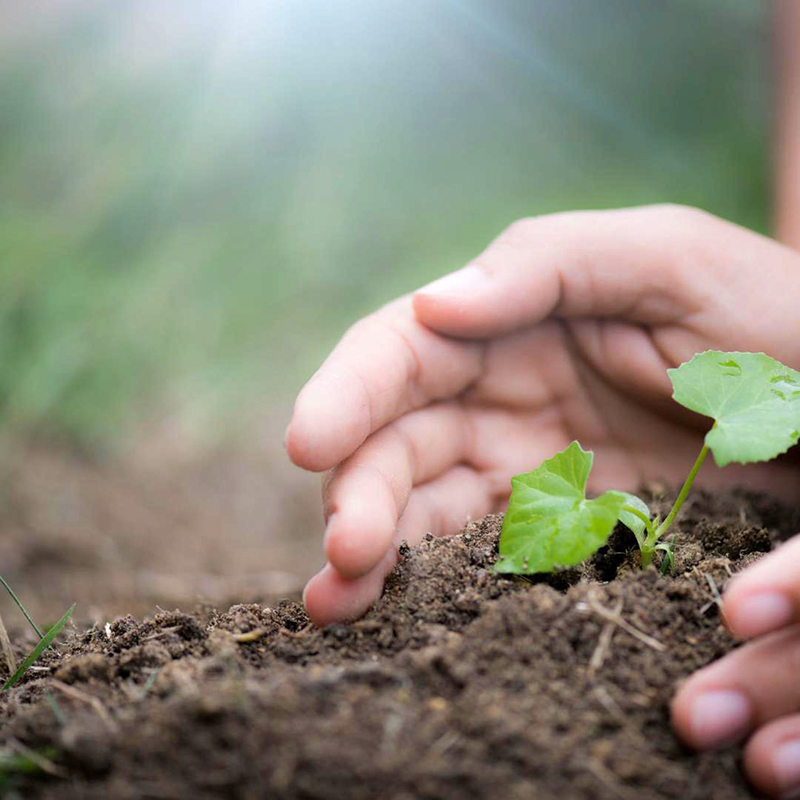2020 Workshop on Transforming Humiliation and Violent Conflict
"From a Virus Pandemic to a Pandemic of Dignity:
How Can We Escape Complicity with Institutionalized Humiliation?"
representing the
35th Annual HumanDHS Conference
and the
17th Workshop on Transforming Humiliation and Violent Conflict
December 10 – 12, 2020
Virtual, Teachers College, Columbia University
Due to the coronavirus pandemic, this was a virtual conference
Rather than two long days as in past years, we met for three shorter days, Thursday, Friday, and Saturday
each day 11.00 am – 3.30 pm New York City Time (Aotearoa/New Zealand is one day ahead)
• You can relive this workshop by clicking on the video recordings further down on this site
• Download the program as Pdf
• See David Yamada's blog after the workshop "A welcomed online workshop helps to conclude a challenging year" (Link | Pdf)
• See newsletter 35, written subsequent to the workshop by Evelin Lindner
• See the post-workshop gratitude letter sent out on January 26, 2021 "Thank You for Celebrating Our Workshop in December 2020!" (Pdf)
• See the final invitation that was sent out prior to the workshop on 1st December 2020
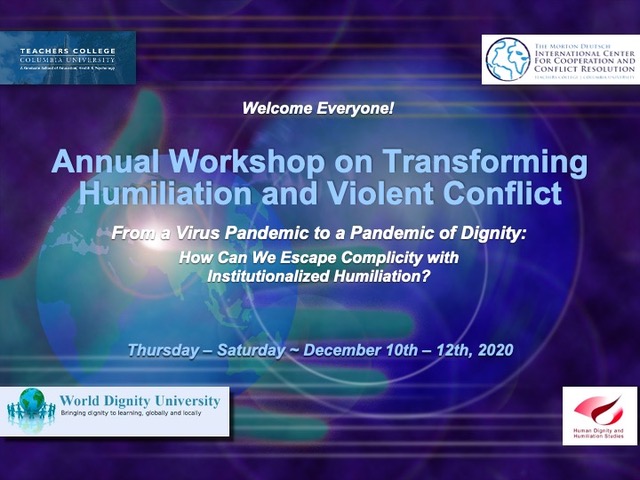
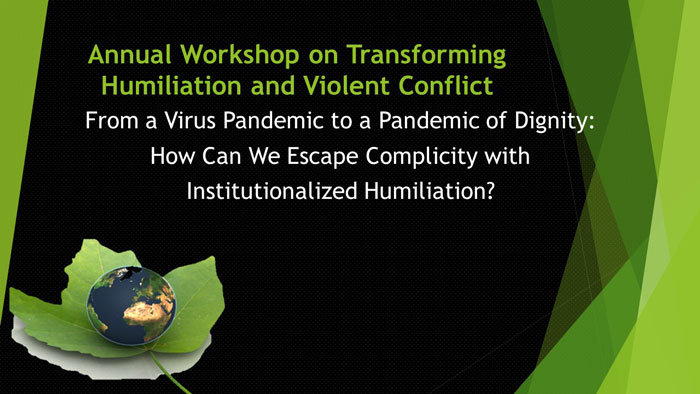
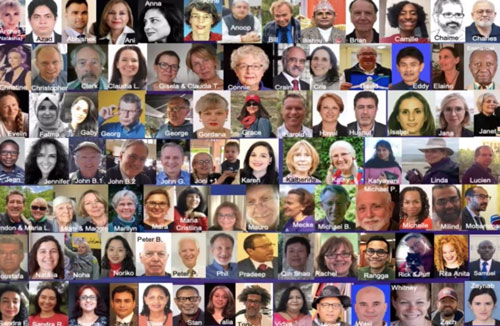
Hosted by
The Morton Deutsch International Center for Cooperation and Conflict Resolution
(MD-ICCCR)
Columbia University, Teachers College (TC)
525 West 120th Street, New York City, NY 10027
in cooperation with the World Dignity University initiative
Honorary Convenor since 2003
Morton Deutsch
First HumanDHS Lifetime Commitment Award Recipient in 2009
(he sadly passed away in March 2017, and we honor his memory)
Evelin Lindner, Morton Deutsch, Linda Hartling
This photo was taken in 2014
Please click on the picture to it larger
Message of gratitude to Linda Hartling
from Evelin Lindner, recorded prior to this workshop on
November 25 and December 9, 2020
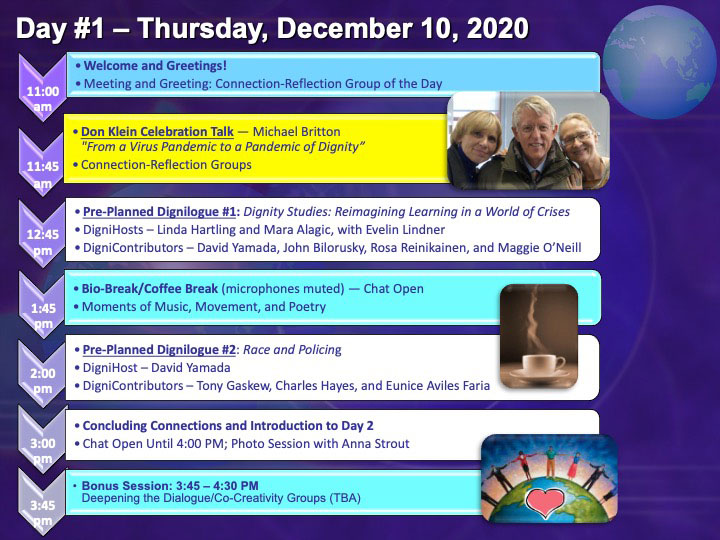
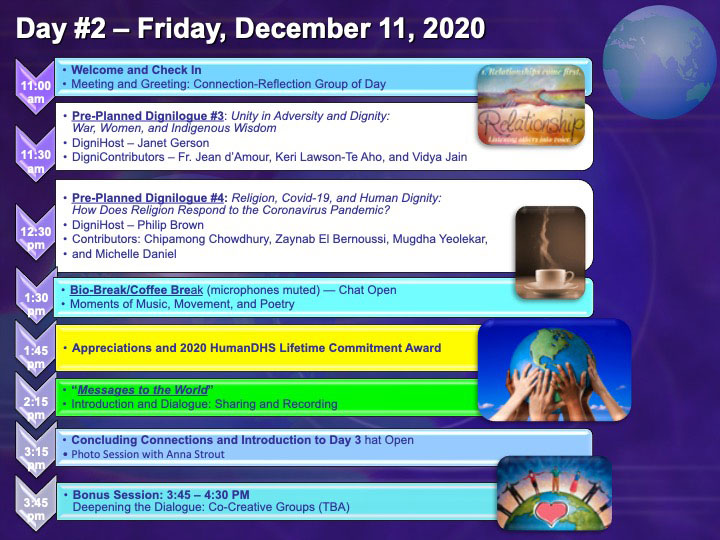
Please click on the images to see them larger
Please click on the images to see them larger
• Day One
• Day Two
• Day Three
• Honoring Peter Coleman
• Messages to the World
• Michael Britton's Don Klein Celebration Talk
• Dignilogue 1: "Dignity Studies: Reimagining Learning in of World of Crises"
• Dignilogue 2: "Race and Policing"
• Dignilogue 3: "Unity in Adversity and Dignity: War, Women, and Indigenous Wisdom"
• Dignilogue 4: "Religion, Covid-19, and Human Dignity: How Does Religion Respond to the Coronavirus Pandemic?"
Dignilogue 5: "Continuing Connections: Dignity Now Groups for Developing Ongoing Dialogue"
• Evelin Lindner's Talk
• Music, Movement, and Poetry
All our workshops are invitations to explore how we can best deepen, grow, and practice the global message of dignity — now and far into the future.
If you wish to participate in our workshops, please send an email to workshops@humiliationstudies.org. Please kindly include your contact information and any other details you would like to share with our community (such as CV, papers, articles, presentations, video links, etc.).
Please know that you are always invited to spend the entire workshop with us, so that true dignity-family building can emerge. All our events are part of an ongoing effort to nurture a global community of people who wish to nurture more dignity in the world. The workshop series follows a format of organic growth, and is thus different from mainstream conferences. In all our events, our aim is to create a community — rather than having an "audience" listen to "speakers" or "presenters." All participants are warmly invited to fill out our Appreciative Introduction form (Word | PDF) and send it to us or bring it with them.
There is no registration fee, we share minimal cost according to ability. To cover our expenses, we always summarise the costs during the conference and invite participants to contribute according to their ability. This collaborative approach to financing allows us to keep the conference affordable for all. Our work is a labor of love and maintained entirely by those who give their time and energy as a gift. All our efforts are pro bono and not-for-profit endeavors. Everyone who participates does so because of dignity, because of their appreciation for our work for dignity. Nobody is there "for the money," nobody is being paid, there is no "paid staff." This is our way of walking our talk of "being the change we want to see in the world." We welcome all donations to this workshop, be it your time, your creativity, or, if you wish, your economic support (please see this secure link). We thank all participants in our conferences for being fully responsible for bearing the cost of their own travel, transportation, and accommodation arrangements. We also strive to organize our conferences as Green Conferences. Thank you for your loving support!
This page is part of our larger website that serves as a "virtual field journal" and an open resource, documenting all of our events and initiatives over time, always remaining available to global dignity community. Our members regularly consider a variety of electronic options for sharing our efforts on social media (see, for instance, the Digniworld initiative), and we have found it beneficial to keep the main HumanDHS website organized by posting the contents of events on extended pages, with links to additional information both on other pages of our website and on external places. The entire website resembles a large organism, a large web of content that weaves together our entire work since 2001.
During our conferences, we always ask all participants for their permission to have their pictures or videos posted on our website, however, if you change your mind later, either in total or for specific pictures/videos, please let us know! Thank you! Since we wish to walk the talk of dignity, it is very important for us to do our utmost in respecting everybody's privacy. We refrain from gathering written permissions from you during our conferences, since we value the building of mutual trust in relationships, and we also would like to refrain from contributing to an ever more bureaucratic and legalistic society.
• See the program of this workshop further down on this site or as Pdf
• See the post-workshop gratitude letter sent out on January 26, 2021 "Thank You for Celebrating Our Workshop in December 2020!" (Pdf)
• See the final invitation for the workshop that was sent out on 1st December 2020
• See the invitation that was sent out on November 2, 2020
• See the invitation was sent out on August 31, 2020, and this invitation was sent out on April 27, 2020
• See the general invitation letter to this workshop
• For previous workshops, see a compilation of all NY workshops and the newsletters written after these conferences. See in particular newsletter 35, written subsequent to the workshop by Evelin Lindner, who also updated this webpage.
• This workshop was the seventeenth workshop in a series that began in 2003. See an overview over all our previous conferences and see the workshops of 2004, 2005, 2006, 2007, 2008, 2009, 2010, 2011, 2012, 2013, 2014, 2015, 2016, 2017, 2018, 2019.
Program
Thank you for reviewing the following tips for smooth zooming:
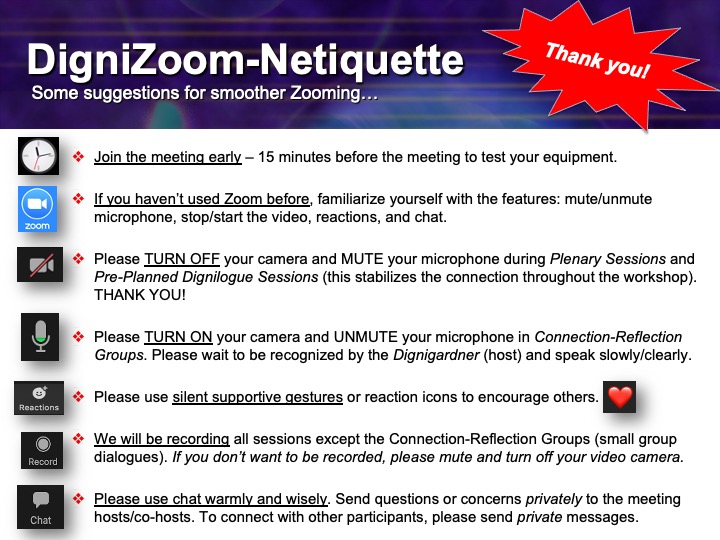

Please click on the images to see them larger. All sessions were recorded except for the Connection-Reflection Groups.
If you did not want to be recorded, you were asked to please kindly turn off your video and microphone on Zoom.
In all our gatherings, we ask you to please kindly mute your microphone and turn off your video during plenary sessions
to protect the quality of our electronic connection.
Thank you!
Day One, Thursday, December 10, 2020
• 11.00 am (New York City time, EST, please calculate your local time)
• Welcome and Greetings! – Linda Hartling, Danielle Coon, Evelin Lindner (Video)
• Introduction by Bhante Revata Dhamma, Nomad Eco-Monk (Video)
• Participants welcomed each other in the chat
• Danielle Coon welcomed all participants (Video)
Danielle Coon is the Associate Director of the Morton Deutsch International Center for Cooperation and Conflict Resolution (MD-ICCCR), Columbia University, Teachers College (TC)Our profound gratitude goes to you, dear Danielle Coon and Peter Coleman, for hosting us also this year! What an important way to honor Morton Deutsch, and what a gift to all those who wish to bring more dignity into this world! We celebrate Morton Deutsch and the MC-ICCCR.
• Linda Hartling, Director of Human Dignity and Humiliation Studies, and Evelin Lindner, Founding President of Human Dignity and Humiliation Studies, welcomed all participants (Video)
• Anna Strout gathered the participants for her group photos (long | short | Video at the end of the day)
• Linda Hartling introduced the Appreciative Frame for this workshop (Video 2020)
We use the perspective of Appreciative Enquiry as frame for our work. See introductions shared in previous workshops:
2019, 2016, 2015, 2014 (see also Pdf), 2012, 2011, and see An Appreciative Frame, written by Linda Hartling in 2005• Meeting and Greeting: Connection-Reflection Groups — explained by Janet Gerson (Video)
• The "Digni-Gardeners" of each group shared thoughts and reflections in the chat when they returned into the main room.
Group 5, for instance, with Mara Alagic, Georg Geckler, George Wolfe, Kathy Beckwith, and Christopher Pollmann, shared this message from George Wolfe: "We need to understand the threefold definition of violence, which is physical, psychological and structural."• George Wolfe offered his Native American Flute Improvisation (Video recorded on July 12, 2020)
See also George Wolfe's improvisation with Robert Willey playing the drum (Video December 12, 2020, and pre-recorded on August 30, 2020, Video), and see also George Wolfe's saxophone play at the 2014 workshop (Video)
• 11.45 am
• Don Klein Celebration Talk — Michael Britton "From a Virus Pandemic to a Pandemic of Dignity” (Video)

• In the annual Workshop on Transforming Humiliation and Violent Conflict that takes place each year at Columbia University, Michael Britton holds the Don Klein Celebration Lecture in place of the lecture that Don Klein held each year until he passed away in 2007, titled The Humiliation Dynamic: Looking Back... Looking Forward
• This is Michael Britton's Don Klein Celebration Lecture of 2020 (Video)
See also the original video that was pre-recorded on October 18, 2020, and edited by Linda Hartling on December 3, 2020
• Please see all of Michael Britton's Don Klein Celebration Lectures since 2007 here
• Michael uses Don's metaphor of a scrim, a transparent stage curtain, where one believes that what one sees is reality only as long as the light shines on it in a certain way: see Don's explanation.• Harold Becker: The Love Foundation — Celebrating 20 Years (Video)
• Connection-Reflection Groups
• 12.45 pm
• Pre-Planned Dignilogue #1: Dignity Studies: Reimagining Learning in of World of Crises
• DigniHosts – Linda Hartling, Mara Alagic, and Evelin Lindner
• DigniContributors – David Yamada, John Bilorusky, Rosa Reinikainen, and Maggie O’Neill
• Pre-Dignilogue 1: Chat
• Video of Full Length of the Dignilogue
• Mara Alagic (Video)
• Evelin Lindner (Video)
• Introduction by Linda Hartling (Video)
• David Yamada (Video)
• John Bilorusky (Video)
• Rosa Reinikainen (Video)
• Maggie O'Neill (Video)
• Mara Alagic (Video)

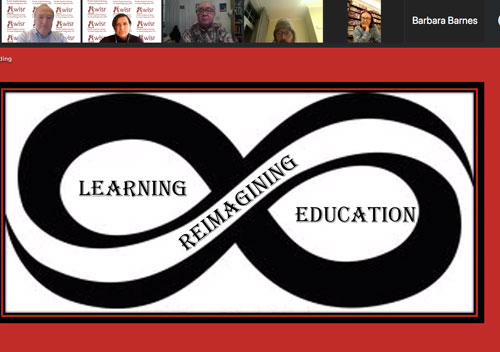
• David Yamada (Video)
See David Yamada's wonderful post-workshop blog "A welcomed online workshop helps to conclude a challenging year" (Link | Pdf)
• Maggie O'Neill (Video)
Dear Maggie O'Neill! Thank you for sharing the links to this work:
• Participation Arts and Social Action in Research (PASAR): Theatre Making and Walking in Research with Migrant Women, with Umut Erel, Ereni Kaptani, Tracey Reynolds and Maggie O’Neill, a short film by Marcia Chandra that shares the work and importantly the process. (Video | Pdf comment | PASAR)
• Walking Conversations with Maggie O’Neill, Arpad Szakaloczai, Ger Mullally, the Dingle Creativity and Innovation Hub and students and teachers from the Pobalscoil Chorca Dhuibhne. Walking is a mundane activity but also fundamental to our way of being and sociality, taking a walk with someone is a powerful way of communicating about experience, we can become attuned and connected in a lived embodied way with the feelings and lived experience of another. Pioneering Anthropologist Tim Ingold talks about walking as the ‘art of paying attention’. Walking opens a space for dialogue, and embodied knowledge and experience can be shared, it is ‘convivial’ in the senses described above. This short film by Jan Haaken and Maciej Klich shares this work in progress and in process on walking conversations and the walking classroom. (Video | Pdf comment)
• John Bilorusky (Video)
Dear John Bilorusky! Thank you for sharing your reflections on the severe coronavirus pandemic.
Thank you also for sharing this material:
• The Role of Transformative Action-and-Inquiry in Dignity Studies: Beyond Personalized Education with Curiosity and Commitment, by John Bilorusky
• Two articles of potential interest, on how people sometimes change despite their racist and white supremacist views, going beyond trauma, feelings of victimization, learning from stories, and changes in emotions may be among the possible “ingredients”:
• "Deradicalization in the Deep South: How a Former Neo-Nazi Makes Amends," by DJ Cashmere, Yes Magazine, November 12, 2019.
• "Yes, You Can Change Someone’s Mind," by Amanda Abrams, Yes Magazine, November 12, 2019.• Connection-Reflection Groups
• 1.45 pm
• DigniBreak/Bio-Break/Coffee Break (please mute) — Chat Open
• Moments of Music, Movement, and Poetry Shared Throughout the Workshop, see Contributors Below• Rick Slaven: Director of Dignifunding (Video | Video recorded in December 2020 in Portland, Oregon | gift to HumanDHS | support of Evelin)
• Bonnie Selterman: Escaping Complicity — A Poem (Video | Pdf | Spoken recording on November 21, 2020)
• 2.00 pm
• Pre-Planned Dignilogue #2: Race and Policing
• DigniHost – David Yamada
• DigniContributors – Tony Gaskew, Charles Hayes, and Eunice Avilés Faria• Video of the Full Length of the Dignilogue
• Introduction by David Yamada (Video)
• Tony Gaskew (Video)
• Charles Hayes (Video)
• Eunice Avilés (Video)
• David Yamada (Video)
Thank you, dear David, for hosting this Dignilogue and for your wonderful post-workshop blog "A welcomed online workshop helps to conclude a challenging year" (Link | Pdf)!
Thank you, furthermore, for sharing your important work:
• "Should Public Policy Center on Society’s Well-Being?" by David Yamada, The American Commentator, October 2020 (Pdf)
• Yamada, David C. (2019). "Therapeutic Jurisprudence, Intellectual Activism and Legislation." In The Methodology and Practice of Therapeutic Jurisprudence, edited by Nigel Stobbs, Lorana Bartels, and Michel Vols. Chapter 5. Durham, NC: Carolina Academic Press. (Pdf)
• Yamada, David C. (2018). "On Anger, Shock, Fear, and Trauma: Therapeutic Jurisprudence as a Response to Dignity Denials in Public Policy." In International Journal of Law and Psychiatry. doi: 10.1016/j.ijlp.2018.06.009 (Pdf). This article asserts that when policymaking processes, outcomes, and implementations stoke fear, anxiety, and trauma, they often lead to denials of human dignity.
• Tony Gaskew (Video)
Dear Tony, we look forward to your forthcoming book Lessons Learned from the Front Lines of Black Liberation, Lexington Books, 2021.
• Charles Hayes (Video)
Thank you, dear Charles, for your valuable contribution:
Dignity means being worthy of respect.
• Eunice Avilés (Video)
Thank you, dear Eunice, for your valuable contribution:
Dignity is the idea that everyone should be valued and respected.Thank you, dear John Bilorusky, for sending this along:
• Access to You Tube videos of Racist Policing Seminars offered by the Western Institute for Social Research (WISR): June 27, 2020 and August 22, 2020• Connection-Reflection Groups
• 3.00 pm
• Concluding Connections for Day 1 and Introduction to Day 2
• Photo Session with Anna Strout
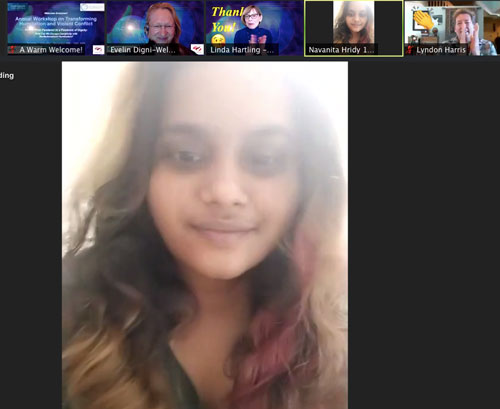
• Navanita Hridy Sang Imagine by John Lennon (Video)
• Navanita Hridy Sang Hallelujah by Leonard Cohen (Video | Audio)
• Linda Hartling Wrapped Up Day One and Shared Michael Perlin's "Message to the World" (Video | Text | Video recorded on December 7, 2020)• Lyndon Harris announced his Bonus Dignilogue on Forgiveness (Video | Video of his Dignilogue | Video of his Afterthoughts | see also his "Message to the World" Video | Video recorded on December 10, 2020)
• Linda Hartling thanked for Day One (Video)
• Linda Hartling said good bye for Day One (Video)
• Anna Strout: End of Day One Photo Session (Video | see also long | short)
• 3.45 pm
• Bonus Session 3:45 – 4:30 pm: Deepening the Dialogue/Co-Creativity Group
Lyndon Harris: Dignilogue on Forgiveness as a Tool for Conflict Transformation "Healing the Wounds of History” (Video)• with Tony Gaskew, Mecke Nagel, Isabel Barroso, and Maria Lund
• Lyndon Harris announced his Bonus Dignilogue on Forgiveness (Video)
• Lyndon Harris shared Afterthoughts on Day Three (Video)
Thank you also for sharing this wonderful message, dear Lyndon!
• "Message to the World — Forgiveness" (Video | Video recorded on December 10, 2020)
Day Two, Friday, December 11, 2020
• 11.00 am (New York City time, EST, please calculate your local time)
• Welcome and Check In
• Ikhlaq Hussain: Love Letter 3 - Aaj Jaane Ki Zid Na Karo in Raag Yaman (recorded in Geneva on August 15, 2020)
• Linda Hartling introduced Day Two (Video)
• Janet Gerson explained the Connection-Reflection Groups (Video)
• Meeting and Greeting: Connection-Reflection Groups
• Christine de Michele sang about the black community's significance for Jazz Music, in honor of Tony Gaskew's talk yesterday (Video)
• Rick Slaven: Director of Dignifunding (Video Day Two | Video Day One | Video pre-recorded in December 2020 in Portland, Oregon | gift to HumanDHS | support of Evelin)
• 11.30 am (New York Time, in New Zealand, it is Saturday, December 12, 5.30 am)
• Pre-Planned Dignilogue #3: Unity in Adversity and Dignity: War, Women, and Indigenous Wisdom
• DigniHost – Janet Gerson
• DigniContributors – Fr. Jean d’Amour, Keri Lawson-Te Aho, and Vidya Jain• Video of the Full Length of the Dignilogue
• "I Prefer to Die With Them" The Story of Rwandan Heroine Félicité Niyitegeka with Jean d'Amour (Video | original film on Gwen Gates's channel | HumanDHS channel, September 11, 2020)
• Keri Lawson-Te Aho (Video)
• Vidya Jain (Video)
• Post-Dignilogue 3: Janet Gerson (Video)
• Félicité Niyitegeka with Jean d'Amour (Video)
Dear Father Jean d'Amour! Thank you for your work!
• "I Prefer to Die With Them": The Story of Rwandan Heroine Félicité Niyitegeka, written by Father Jean d'Amour Dusengumuremyi, narrated by Gwen Gates, September 11, 2020 (original film on Gwen Gates's channel | HumanDHS channel). Thank you for the lovely song you made! And thank you also for your "Message to the World" that you shared on Day Three of this workshop (Video)!
Felicitas Niyitegeka gave her life in the genocide that ravaged Rwanda in 1994, targetting Tutsi together with moderate Hutu who were opposed to the killing. Father Jean d'Amour Dusengumuremyi wrote a book about her, published in our Dignity Press, titled No Greater Love: Testimonies on the Life and Death of Felicitas Niyitegeka. Felicitas Niyitegeka was an Auxiliaire de l'Apostolat, a laïque engagée, who had dedicated herself to a celibate life to serve the common good with love. She was the responsible head of the Catholic charitable home Centre Pastoral St. Pierre of the Diocèse de Nyundo in Gisenyi. She saved the lives of many Tutsi, and, at last, she chose to die together with the Tutsi women who were in her care and whom she could not save. We held our 25th Annual Conference of Human Dignity and Humiliation Studies in Kigali, Rwanda, 2nd - 5th June 2015, as a tribute to Felicitas Niyitegeka.
• The African ubuntu philosophy says "I am because of you, we are because of each other," "Umunthu ngamunthu ngabantu": "A person is a person through other people"! Dear Jean, YOU give us hope that this Nguni motto will guide us all, all of humankind, hopefully in not too distant future!
• We thank Emmanuel Ndahimana for his the message to this workshop, where he mentions ubuntu! We thank also Bishop Desmond Tutu for his explanation of ubuntu. We are grateful to both Emmanuel Ndahimana and Bishop Desmond Tutu for their support to our dignity work! Bishop Tutu kindly contributed with the Foreword to Evelin's book on love in 2010, and Emmanuel Ndahimana hosted our 2015 Dignity Conference in Kigali that we held as a tribute to Felicitas Niyitegeka in the spirit of the United Nations agenda towards "A Life of Dignity for All," and in the spirit of umuganda, "coming together in common purpose" (the traditional practice of communities self-solving their problems).
• We thank, furthermore, scholar Joy Ndwandwe for explaining ubuntu on 26th April 2013 in our 2013 Annual Dignity Conference in Stellenbosch, South Africa, that was titled ‘Search for dignity’, April 24–27, 2013.
• Keri Lawson-Te Aho (Video)
Thank you so much, dear Keri, for your description of dignity:
I translate dignity as a combination of mauri, mana and tapu. Mauri is the life-force. Tapu is sacredness and mana is power used for good. Mana is conveyed to an individual as a result of kindness and humanitarian actions for the good of all people. Mana is given by the people on the strength of good deeds towards others. Mauri is something we are born with. Mana, mauri and tapu come together as a result of actions and behaviours towards others, that come from a deep place of aroha/aloha/love and compassion. Tapu recognises that everyone is sacred.
I would like to first and foremost, listen to the stories of others who believe in the kaupapa/purpose of ending humiliation and violence and to meet the people who are part of this incredible network, to tell you how much I respect you all. I would also like to learn new skills, share our experiences here in Aotearoa/New Zealand to breathe in the magnificence of the kaupapa of our movement. I would also like to discuss strategy and ways to build our international community.
Thank you so much for sharing, dear Keri:
• Keri Lawson-Te Aho and Mr. Paikea Tamuera Ariki Sing Ko te Amorangi (Text | Video, recorded on December 9, 2020, in Aotearoa New Zealand)
• Keri Lawson-Te Aho and Mr. Paikea Tamuera Ariki Sing Whakataka te hau (Text | Video, recorded on December 9, 2020, in Aotearoa New Zealand)
• Dear Keri, we look forward to your kōrero (a talk) that speaks about upholding the dignity of Māori women through story-telling and ancestral connections that re-dignify Māori women!
• Vidya Jain (Video)
Thank you for your important work, dear Vidya!
• Gandhian Model of Sustainable Individual, Convener of the Nonviolence and Peace Movements Commission of the International Peace Research Association (IPRA), and Former Director of the Centre for Gandhian Studies at the University of Rajasthan, Jaipur, India
• Janet Gerson (Video)
We so much look forward to a continuation of this wonderful Dignilogue, dear Janet!
• Connection-Reflection Groups
Messages from the groups:
• Peter Barus : for our group: We heard powerful indigenous voices, and speakers from very different backgrounds; all around the world, no matter circumstances, there are universal truths and intuitive knowledge that binds the human race; if you connect with nature, compassion arises for other human beings, you end up wanting to protect the people around you; Gandhi, like other famous spiritual leaders, transcended personal experience and inspires everyone; looking forward to learning more about his feminism; don't like to divide genders, creates divisions, separates us from others.
• Antoinette Errante : A dignilogue waiting to become sounds like a great idea!
• Susan Misra : 1 idea from our group - Does gender influence how people approach war? Does gender - namely female-identified folks - offer a way to make sense of violence across the world? What does it mean to be a feminist and how do respect feminism that uplifts some in a country while also oppresses others in the same country?
• Lucien Lombardo : Great discussion in Group 10 of the layering of generations and the role of the state in ‘causing trouble’ for families of marginalized groups across generations! Also of Ubuntu and Gandhian thought!
• George Wolfe : Umbutu I think is best understood as relationship. We need to strive to live in “compassionate relationship.”
• Martha Eddy : Group 7: The importance of humility in overcoming gender stereotypes - finding common ground of caring in order to move out of humiliating behaviors or policies. For men and women to equally experience their own anima and animus - internal male and female energies in each of us.
• Elaine Meis : Some thoughts from our group: All of these practices are couched in culture.
• Elaine Meis : ...more thoughts . Dialogue across cultures. What moral courage looks like. Freedom of thought.
• Group with Olav Ofstad, Isabel Barroso, Fatma Tufan, Georg Geckler, Veronica Bruer: Interest in education
• 12.30 pm
• Pre-Planned Dignilogue #4: Religion, Covid-19, and Human Dignity: How Does Religion Respond to the Coronavirus Pandemic?
• DigniHost – Phil Brown
• DigniContributors – Chipamong "Chipa" Chowdhury Bhante Revata Dhamma, Zaynab El Bernoussi, Mugdha Yeolekar, and Reverend Darrell Daniel for Michelle Daniel Jones• Full Length with Introduction by Phil Brown (Video)
• Zaynab El Bernoussi (Video)
• Mugdha Yeolekar (Video)
• Chipamong "Chipa" Chowdhury Bhante Revata Dhamma (Video | On Dignity Video)
• Darrell Daniel for Michelle Daniel Jones (Video)
• Introduction by Phil Brown (Video)
Dr. Philip Brown is a Coach for the National School Climate Center and President of the newly reorganized International Center for Assault Prevention.
• Zaynab El Bernoussi (Video)
Thank you for sharing this article, dear Zaynab!
• "World War C: How the COVID-19 Pandemic Should Teach Us to Consume Less and Cooperate More?" by Zaynab El Bernoussi, Tribune Libre, Number 5, August 2020
• Mugdha Yeolekar (Video)
Mugdha Yeolekar is an assistant professor at California State University, Fullerton Hawthorne, California, United States
• Bhante (Video | On Dignity Video)

Thank you for your wonderful meditations, dear Bhante!
• On Dignity (Video)
Thank you, dear Bhante, for your inspiring life as a nomad monk!
• Bhante Revata Dhamma: The Nomad Monk (Videos recorded in 2020, brought together by Linda Hartling on December 3, 2020)
• Bhante Revata Dhamma: Poetry 2 (Video recorded in 2020)
• Bhante Revata Dhamma: Poetry 3 (Video recorded in 2020)
The above listed videos of Bhante Revata were only shared during the workshop (Bhante Revata Dhamma is the monk's name used in the monastic communities for Chipamong Chowdhury, which is his family name, known only to close friends)
See also his Monk's Winter Hike, January 23, 2021, and his Nomad Monk YouTube channel.
• Darrell Daniel for Michelle Daniel Jones (Video)
Thank you, dear Darrell, for stepping in for your wife Michelle!
Michelle Daniel Jones is interested in critical prison studies, collateral consequences of criminal conviction, and leadership.• Connection-Reflection Groups
• 1.30 pm
• DigniBreak/Bio-Break/Coffee Break (please mute) — Chat Open
• Moments of Music, Movement, and Poetry Shared Throughout the Workshop, see Contributors Below
• Welcome back by Linda Hartling
(Video)
• Bhante Revata Dhamma: On Dignity (Video)
• Martha Eddy offered a DigniStretch activity (Video) followed by How to Be Alone and Water Dance (see also DigniCalm and DigniStretch activities pre-recorded on December 4, 2020)
• Audrey Hurley: The Lord's Prayer (Audio recorded on November 20, 2020)
• 1.45 pm
• Appreciations and 2020 HumanDHS Lifetime Commitment Award
Peter Coleman Is Being Honored with the 2020 HumanDHS Lifetime Commitment Award
Video edited by Linda Hartling on December 16, 2020
• Award Ceremony (Video)
• Message of Appreciation from Evelin Lindner (Pdf)
• Peter Coleman's Remarks in Appreciation of the 2020 HumanDHS Lifetime Commitment Award, recorded on December 11, 2020 (Video)
• See also Peter Coleman’s Life Story in "Fundamentals of Conflict Resolution, Instructor Peter Coleman Highlights #ScholarStrike," MD-ICCCR at Teachers College, Columbia University, September 11, 2020 (Video)
Peter T. Coleman is Professor of Psychology and Education at Columbia University where he holds a joint-appointment at Teachers College and The Earth Institute. Dr. Coleman directs the Morton Deutsch International Center for Cooperation and Conflict Resolution (MD-ICCCR), is founding director of the Institute for Psychological Science and Practice (IPSP), and is executive director of Columbia University’s Advanced Consortium on Cooperation, Conflict, and Complexity (AC4). His next book titled, The Way Out: How to Overcome Toxic Polarization will be released in 2021.
• 2.15 pm
• Messages to the World — Introduction and Dialogue: Sharing and Recording, see Contributors Below
• Evelin Lindner invited into the "Message to the World" (Video 2020)
• Michael Britton and Evelin Lindner offered guidelines for the "World Dignity University (WDU) Messages to the World" (Video 2019)
• Evelin Lindner explained the concept of the "Dignivideos - Messages to the World" (Video 2017)
• Michael Britton explained the concept of the "Dignivideos - Messages to the World" (Video 2017)
• Kathy Beckwith: "Message to the World — Dignity through Kindness, Respect, and Peace" (Video recorded on November 26, 2020)
Congratulations with your book, dear Kathy!
Beckwith, Kathy (2015). A Mighty Case Against War: What America Missed in U.S. History Class and What We (All) Can Do Now, Lake Oswego, OR: Dignity Press
• Marilyn Langlois: "Message to the World" (Video)
• Lucien Lombardo: "Message to the World — Learning about Dignity" (Text | Video recorded on December 5, 2020)
• Vinod Verma: "Message to the World" (Video | see also Call the Whistle, Documentary shared on December 11, 2020 | see his Gift of Singing on the last day Video)
• Christopher Pollmann: "Message to the World — About a Vicious Spiral against Muslims in France" (Text | Video | Short Video | Long Video recorded on December 7, 2020)
• Gershon Mitchel: "Message to the World" (Video | see also his Note of Appreciation Video | First Things First: A Universal Truth — A Poem Spoken recording on December 4, 2020)
• Lyndon Harris: "Message to the World" (Video | Video pre-recorded on December 10, 2020) See also his Dignilogue on Forgiveness (Video | Video of his Announcement | Video of his Afterthoughts)
• His Royal Highness Prince El Hassan bin Talal: "Message to the World" (Video edited by Linda Hartling on January 3, 2021)
See the original Video that His Royal Highness pre-recorded in the Majlis in Amman, Jordan, on December 10, 2020.
A statesman and peacemaker, His Royal Highness Prince El Hassan bin Talal of Jordan has worked for decades to promote peace, interfaith dialogue, and humanitarian justice. He has served as the president of the Club of Rome from 1999 to 2007, the board of directors for the Center for Peace Studies and Conflict Resolution at the University of Oklahoma, the Parliament of Cultures, the Royal Jordanian Polo Club, and the International Tolerance Foundation for Humanities and Social Studies, and is honorary president of the Euro-Mediterranean Association for Cooperation and Development since 2012.
Prince El Hassan bin Talal is a member of the Jordanian royal family, he is the brother of King Hussein, who was King of Jordan until his death in 1999, and he is the uncle of King Abdullah II, the present King of Jordan, who reigns since February 7, 1999.
• 3.15 pm
• Concluding Connections for Day 2 and Introduction to Day 3 – Chat Open Until 4 pm
• Photo Session with Anna Strout• Andrea and Regina: Der Mond ist aufgegangen (Video of verse 1 on Day Two | Video of verse 2 on Day Three | Video of verse 1 + 2) Der Mond ist aufgegangen wurde 1790 vom Matthias Claudius als religiöses Abendlied geschrieben, vertont wurde es noch im selben Jahr vom Hofkapellmeister Johann A. P. Schulz. English: The moon has risen was written by Matthias Claudius in 1790 as a religious evening song, and it was set to music in the same year by the court conductor Johann A. P. Schulz.
See also:
• Hameln Sings (all vocal interludes brought together) (Video)• Peace Philosopher Howard Richards is one of the deepest thinkers of our time (Video Day Two | Video Day Three)
Howard Richards recommended two appendices, one titled "ending poverty" and the other "a plan for peace" from his book Understanding the Global Economy. Santa Barbara, CA: Peace Education Books, 2004 (Preface). He explained that these two pieces had been published independently in The Acorn: Philosophical Studies in Pacifism and Nonviolence.
• Concluding Connections for Day 2 and Introduction to Day 3
• 3.45 pm
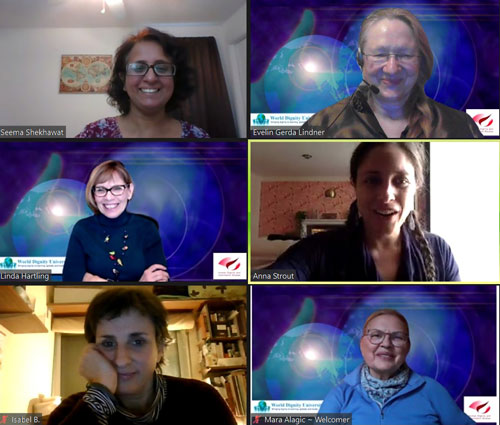
• Bonus Session 3:45 – 4:30 pm: Deepening the Dialogue/Co-Creativity Group
Seema Shekhawat: Dignilogue: Making Dignity Inclusive: Bringing in Women and Other Vulnerable Groups
Seema kindly explained: "I would like to engage participants on how important it is to include (consciously) women and other vulnerable groups in the global struggle for dignity for all, especially in the pandemic scenario.”
Day Three, Saturday, December 12, 2020
• 11.00 am (New York City time, EST, please calculate your local time)
• Welcome and Check In
• We thank Emmanuel Ndahimana for his message to the participants of this workshop, where he mentions ubuntu! We thank also Bishop Desmond Tutu for his explanation of ubuntu. (Listen to Desmond Tutu explaining Ubuntu). We are grateful to both Emmanuel Ndahimana and Bishop Desmond Tutu for their support to our dignity work! Bishop Tutu kindly contributed with the Foreword to Evelin's book on love in 2010, and Emmanuel Ndahimana hosted our 2015 Dignity Conference in Kigali, Rwanda, June 2–5, 2015, that we held as a tribute to Felicitas Niyitegeka in the spirit of the United Nations agenda towards "A Life of Dignity for All," and in the spirit of umuganda, "coming together in common purpose" (the traditional practice of communities self-solving their problems).
• We thank, furthermore, scholar Joy Ndwandwe for explaining ubuntu on 26th April 2013 in our 2013 Annual Dignity Conference in Stellenbosch, South Africa, that was titled ‘Search for dignity’, April 24–27, 2013.• George Wolfe: Native American Flute Improvisation (with Robert Willey playing the drum Video | Video pre-recorded on August 30, 2020 | Video of another improvisation recorded on July 12, 2020 | see also George Wolfe's saxophone play at the 2014 workshop Video)
Congratulations with your book, dear George!
• Wolfe, George W. (2015). Meditations on Mystery: Science, Paradox and Contemplative Spirituality. Lake Oswego, OR: Dignity Press.
• Meeting and Greeting: Connection-Reflection Groups
• 11.30 am
• From Humiliation to Dignity: For a Future of Global Solidarity — From a Virus Pandemic to a Pandemic of Dignity: How Can We Escape Complicity with Institutionalized Humiliation? — Evelin Lindner (Video edited by Linda Hartling on December 18, 2020)
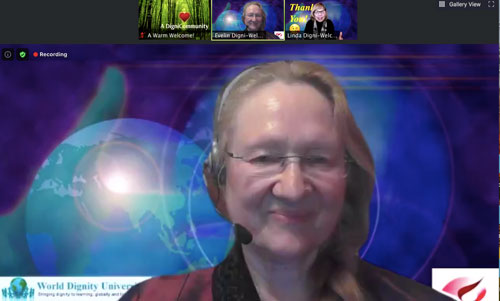
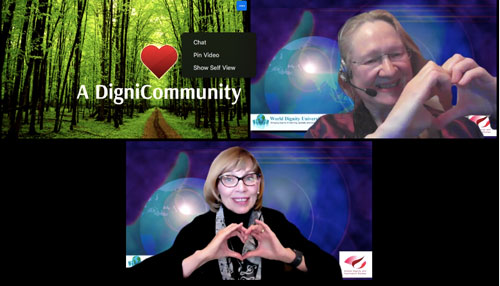
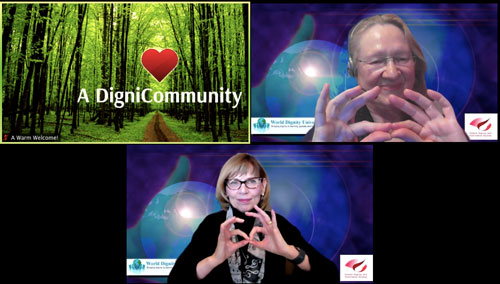
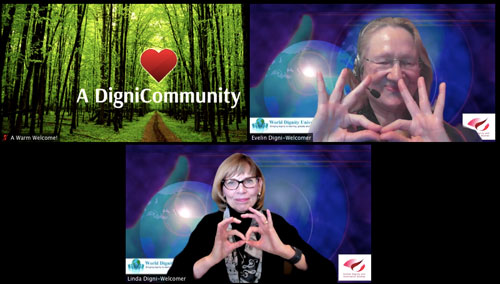
Please click on the photos to see them larger
• Evelin Lindner's 2020 lecture (Pdf | Video)
See several previous versions, all recorded in Germany:
• Version of 45 minutes recorded on December 8, 2020 (Video)
• Version of 48 minutes recorded on December 6, 2020 (Video)
• Version of 51 minutes recorded on December 5, 2020 (Video)
• See a presentation titled "A Meta-Narrative for Times of Radical Transformation" of one hour and ten minutes recorded on November 17, 2020 (Pdf | Video)
• See also a presentation with a similar title prepared for another conference recorded on November 16, 2020, with one version of 25 minutes (Video) and a longer version of one hour (Video)
• Connection-Reflection Groups
• Kathy Beckwith: Child of the Earth (Video on Day Three | Audio recorded on November 5, 2020)
• 12.30 pm
• Pre-Planned Dignilogue #5: Continuing Connections: Dignity Now Groups for Developing Ongoing Dialogue
• DigniHost – Elaine Meis, supported by Linda Hartling, Janet Gerson, and Evelin Lindner
• Contributors: The Dignity Now New York Group & the Dignity Now Hameln (Hamelin) Group• The Dignity Now New York City Group presented itself, introduced by Linda Hartling, Elaine Meis, and Janet Gerson (Video)
• The Dignity Now Hameln Group was introduced by Evelin Lindner (Video)
• Contribution from Hameln: Dignity Now: Hameln Presents Good Ideas from the Past and the Future for a More Sustainable Future. Thoughts Are Unchained (Digniworld channel | HumanDHS channel, recorded in October and November 2020, finalized on November 21, 2020)
• Michael Boyer's Digniworld (Video)
• Ideas for the Future (Video)
• Photos (Video)
• Dignity Now New York City Group (Video)
Dear Dignity Now NYC group! Thank you so much for your profound dignity work! (PowerPoint)
• We had the first meeting in Janet Gerson's NYC art gallery home on November 14, 2015!
• Dignity Now Hameln Group
(Video)Dear Dignity Now Hameln group! Thank you for your profound dignity work!
• Evelin Lindner introduced the Dignity Now Hameln Group (Video)
• Dignity Now: Hameln Presents Good Ideas from the Past and the Future for a More Sustainable Future. Thoughts Are Unchained (see it on the World Dignity Movement channel or on the HumanDHS channel, recorded in October and November 2020, finalized on November 21, 2020)
See more in detail:
• 01 Marienhof (World Dignity Movement channel | HumanDHS channel)
• 02 Unverpackt Laden (World Dignity Movement channel | HumanDHS channel)
• 03 Song Die Gedanken sind Frei / Thoughts are Unchained (World Dignity Movement channel | HumanDHS channel)
Listen to more beautiful voices and lyrics from Hameln!
• Andrea and Regina: Der Mond ist aufgegangen (Video of verse 1 on Day Two | Video of verse 2 on Day Three | Video of verse 1 + 2) Der Mond ist aufgegangen wurde 1790 vom Matthias Claudius als religiöses Abendlied geschrieben, vertont wurde es noch im selben Jahr vom Hofkapellmeister Johann A. P. Schulz. English: The moon has risen was written by Matthias Claudius in 1790 as a religious evening song, and it was set to music in the same year by the court conductor Johann A. P. Schulz.
See also:
• Hameln Sings (all vocal interludes brought together) (Video)
• Michael Boyer's Digniworld (Video)
• Michael Boyer's Digniworld and Musical Art
(Video)• Dear Michael Boyer, thank you so much for your Digniworld initiative that you created in 2019: Digniworld WordPress | Digniworld Facebook | Digniworld Twitter | Digniworld Instagram | World Dignity Movement (on YouTube)
• Dear Michael, thank you also for your wonderful vocal interlude! (Video at the end)
• Ideas for the Future
(Video)
• Photo Session with Anna Strout
(Video)• Connection-Reflection Groups
• 1.30 pm
• DigniBreak/Bio-Break/Coffee Break (please mute) — Chat Open
• Moments of Music, Movement, and Poetry Shared Throughout the Workshop, see Contributors Below• Linda Hartling invited into the DigniBreak (Video)
• Gershon Mitchel: First Things First: A Universal Truth — A Poem (Spoken recording on December 4, 2020 | see also his "Message to the World" Video | his Note of Appreciation Video)• Georg Geckler: "Message to the World" (Text | Video recorded on November 30, 2020)
• 1.45 pm
• Messages to the World — Introduction and Dialogue: Sharing and Recording, see Contributors Below
• Evelin Lindner invited into the "Message to the World" (Video 2020)
• Michael Britton and Evelin Lindner offered guidelines for the "World Dignity University (WDU) Messages to the World" (Video 2019)
• Evelin Lindner explained the concept of the "Dignivideos - Messages to the World" (Video 2017)
• Michael Britton explained the concept of the "Dignivideos - Messages to the World" (Video 2017)
• Ani Kalayjian: "Message to the World — Transforming Humiliation Through Meaningful World Mindful Actions" (Video Day Three | HumanDHS channel | Meaningful World channel, video recorded on December 8, 2020)
• Father Jean d'Amour: "Message to the World" (Video)
See also his contribution to Dignilogue 3: "I Prefer to Die With Them" The Story of Rwandan Heroine Félicité Niyitegeka (Video | original film on Gwen Gates's channel | HumanDHS channel, September 11, 2020)
• Peter Barus: "Message to the World" (Video)• Virginia Swain: "Message to the World" (Video)
• Harold Becker: "Message to the World" (Video | see also The Love Foundation — Celebrating 20 Years and We Are Love, Orlando, Florida, September 30, 2020)
• Honoring Howard Richards (Video | see also Video of Day Two)
Thank you so much for your seminal work, dear Howard! Thank you for allowing us to honor you!
• George Iheanacho: "Message to the World" (Video)
• Dear Anna Strout, you have no idea what your support for our dignity work since 2012 means to us!
YOU are our dignity angel!
• Photo Session with Anna Strout and "Message to the World — Prevent Domestic Violence" (Video | Video of the original Message to the World created on November 15, 2020)
His Royal Highness Prince El Hassan bin Talal: "Message to the World"
Video edited by Linda Hartling on January 3, 2021See the original Video that His Royal Highness pre-recorded in the Majlis in Amman, Jordan, on December 10, 2020.
A statesman and peacemaker, His Royal Highness Prince El Hassan bin Talal of Jordan has worked for decades to promote peace, interfaith dialogue, and humanitarian justice. He has served as the president of the Club of Rome from 1999 to 2007, the board of directors for the Center for Peace Studies and Conflict Resolution at the University of Oklahoma, the Parliament of Cultures, the Royal Jordanian Polo Club, and the International Tolerance Foundation for Humanities and Social Studies, and is honorary president of the Euro-Mediterranean Association for Cooperation and Development since 2012.
Prince El Hassan bin Talal is a member of the Jordanian royal family, he is the brother of King Hussein, who was King of Jordan until his death in 1999, and he is the uncle of King Abdullah II, the present King of Jordan, who reigns since February 7, 1999.
As to HRH's mention of a "second adulthood," please see:
Mary Catherine Bateson (2010). Composing a further life: The age of active wisdom. New York: Knopf.
Mary Catherine Bateson sees aging today as an “improvisational art form calling for imagination and willingness to learn,” and in this ardent, affirming study, she relates the experiences of men and women — herself included — who, upon entering this second adulthood, have found new meaning and new ways to contribute, composing their lives in new patterns.
We send condolences to Mary's family on her passing on January 2, 2021.
• 2.45 pm
• Concluding Connections for Day 3 and Moving into the World: 2:45 – 3:30 pm
• Photo Session with Anna Strout (Video)
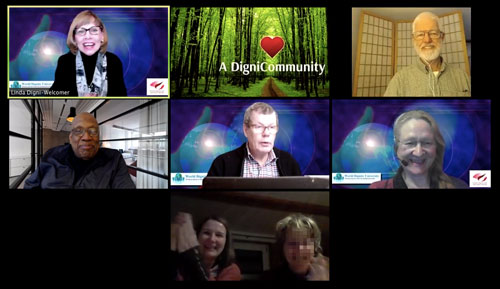
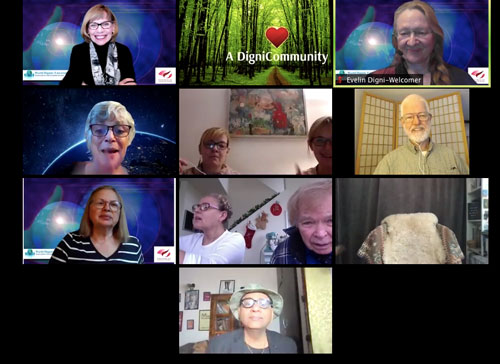

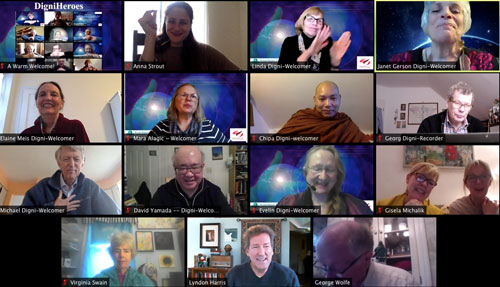
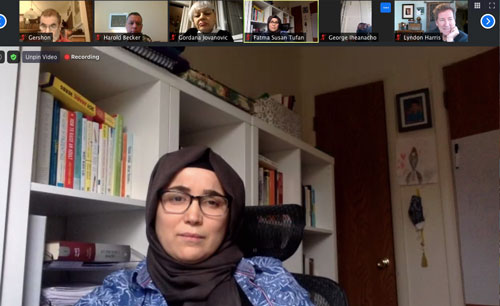
Please click on the photos to see them larger
Notes of Gratitude and Appreciation
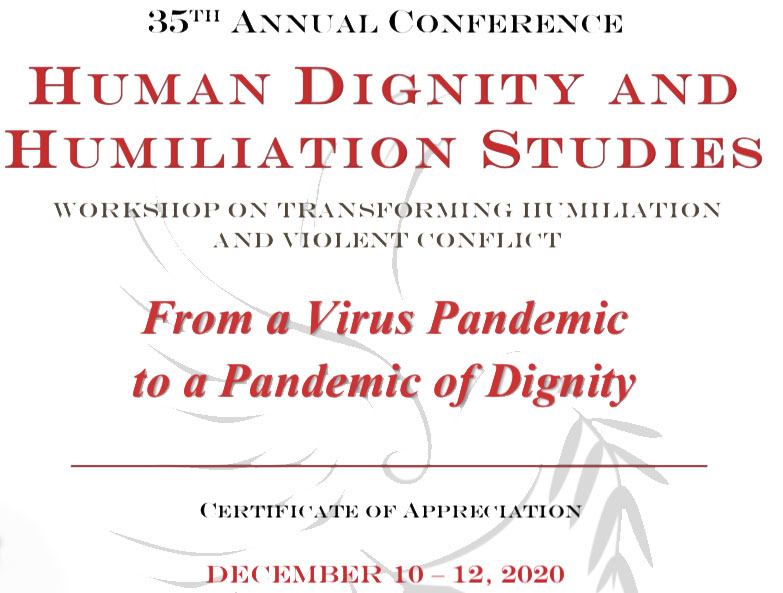
Please download your certificate, fill in your name, and print it out!• Gratitude to the Digni-Gardeners (Video)
• This was Linda Hartling's message to the Digni-Gardeners: "Thank you for being our relational role models, encouraging participants to practice the best skills for dignifying differences through curiosity and conversation, rather than confrontation. Thank you for being our dignity angels in the room!" The role of Digni-Gardener means cultivating a relationally replenishing climate in the Co-Created Dignilogues and the Connection-Reflection groups, especially important this year, a year that drained the energy of many. Beyond listening and participating, the aim is to nurture and even encourage the conversation in a dignifying direction, if this is needed.• Lyndon Harris' Afterthoughts (Video)
• Thank you, dear Lyndon, for your gift of a Dignilogue on Forgiveness on Day One! (Video of Announcement of his Dignilogue | Video of the Dignilogue)
• Thank you also so much for sharing this wonderful "Message to the World — Forgiveness" (Video | Video recorded on December 10, 2020)
• Gratitude to the Digni-Artists (Video)
• Linda Hartling expressed her gratitude to all the wonderful and amazing contributors to moments of music, movement, and poetry throughout the workshop, see contributors below!• Gratitude to the Digni-Planners (Video)
• Linda Hartling expressed her deep gratitude to the wonderful Digni-Planning team of this workshop, all holding hands, albeit virtually!• Linda Hartling and "Heroes" (Video)
• As sign of her gratitude to all who helped her make this workshop possible, Linda Hartling sang the song "Heroes"! Thank YOU, dear Linda!!!• Andrea and Regina: Der Mond ist aufgegangen (Video of verse 1 on Day Two | Video of verse 2 on Day Three | Video of verse 1 + 2) Der Mond ist aufgegangen wurde 1790 vom Matthias Claudius als religiöses Abendlied geschrieben, vertont wurde es noch im selben Jahr vom Hofkapellmeister Johann A. P. Schulz. English: The moon has risen was written by Matthias Claudius in 1790 as a religious evening song, and it was set to music in the same year by the court conductor Johann A. P. Schulz. See also all vocal interludes from Hameln brought together (Video)
• Vinod Verma's Gift of Singing (Video)
The lyrics of Vinod's song translated in English: "Friends, don't bid me good bye, we don't know when we will meet again, I say you stay, and we still have roses and flowers and our feelings to share with."
See also Vinod's "Message to the World" (Video) and Call the Whistle (Documentary shared on December 11, 2020)• Thank you so much, dear Isabel Barroso, for kindly offering your support for our planned Dignity Conference in Madrid (Video)
• Note of Appreciation from Gershon Mitchel (Video)
Thank you, dear Gershon, for your "Message to the World" (Video) and First Things First: A Universal Truth — A Poem (Spoken recording on December 4, 2020)!• Post-Conference Connections (Video)
• If you wish to stay in touch after our workshops, please send us an email at workshops@humiliationstudies.org• Dear Janet Gerson, we so much look forward to a continuation of your wonderful Dignilogue 3 titled Unity in Adversity and Dignity: War, Women, and Indigenous Wisdom (Video)!
• Thank you to all, for reflecting on how to live an integral life, how to dignify all aspects of life, and all ages (Video including a prayer of Evelin's Father)
• Message of Gratitude to Linda Hartling (Video)
Evelin Lindner and David Yamada, together with all other participants, express their deep gratitude and admiration for the leadership of Linda Hartling, who made this workshop possible. At the end Fred Ellis performs, with a recording of his song So Long, See You Soon that he sang on December 5, 2019, at the end of the Public Event of the 16th Workshop on Transforming Humiliation and Violent Conflict, which took place at Columbia University in New York City, December 5 – 6, 2019. See also the message of gratitude to Linda Hartling that Evelin Lindner recorded prior to the workshop, on November 25, 2020, and December 9, 2020 (Video)
• Thank you so much, dear David Yamada, for singing A Wonderful World as a tradition at the end of every annual workshop (Text | Video)
Thank you also for your touching blog after the workshop "A welcomed online workshop helps to conclude a challenging year" (Link | Pdf)
• Concluding Connections for Day 3
• 3.45 pm
• BYOP: Bring Your Own Pizza Party! (Video)
Messages to the World
A big thank you to all creators of
"Messages to the World"!"Messages to the World" are a contribution to the World Dignity University initiative's Library of Ideas to be shared with the world and, hopefully, inspirational for future generations.
See also the virtual book table of Dignity Press with its imprint World Dignity University Press. Thanks to Uli Spalthoff, our not-for-profit Dignity Press has published almost 30 books in the past years! Please note that we are looking for a successor for our dear Uli now, who has given his all over so many years!• Evelin Lindner Invites into the "Message to the World" (Video 2020)
• Michael Britton and Evelin Lindner Offer Guidelines for the "World Dignity University (WDU) Message to the World" (Video 2019)
• Evelin Lindner Explains the Concept of the "Dignivideos - Messages to the World" (Video 2017)
• Michael Britton Explains the Concept of the "Dignivideos - Messages to the World" (Video 2017)• His Royal Highness Prince El Hassan bin Talal
"Message to the World" (Video edited by Linda Hartling on January 3, 2021 | original Video recorded by His Royal Highness in the Majlis in Amman, Jordan, on December 10, 2020 | unedited Video of how his message was embedded into Day Three of this workshop). Prince El Hassan bin Talal has served as the president of the Club of Rome from 1999 to 2007, and is a member of the Jordanian royal family, he is the uncle of King Abdullah II, the present King of JordanPre-recorded messages
• Kathy Beckwith: "Message to the World — Dignity through Kindness, Respect, and Peace" (Video | Video recorded on November 26, 2020)
• Linda Hartling and Evelin Lindner: "Message to the World" (Video recorded on October 25, 2020)
• Evelin Lindner: English, German/deutsch, Norwegian/norsk, French/français (recorded on October 30, 2020)
• Hayal Köksal: "Message to the World" (Video recorded on November 28, 2020)
• Georg Geckler: "Message to the World" (Text | Video | Video recorded on November 30, 2020)
• Lucien Lombardo: "Message to the World — Learning about Dignity" (Text | Video | Video recorded on December 5, 2020)
• Michael Perlin: "Message to the World" (Text | Video | Video recorded on December 7, 2020)
• Christopher Pollmann: "Message to the World — About a Vicious Spiral against Muslims in France" (Text | Video | Short Video | Long Video recorded on December 7, 2020)
• Message to the World — Prevent Domestic Violence (a PSA shared by Anna Strout on November 15, 2020 | Small poster) (PSA = a public service announcement in the public interest disseminated without charge, with the objective of raising awareness)
• Ani Kalayjian: "Message to the World — Transforming Humiliation Through Meaningful World Mindful Actions" (Video Day Three | HumanDHS channel | Meaningful World channel, video recorded on December 8, 2020)
• Lyndon Harris: "Message to the World — Forgiveness" (Video | Video recorded on December 10, 2020 | see also his Dignilogue on Forgiveness on Day One of the workshop, its Announcement, and Afterthoughts)Messages created during the workshop
• Marilyn Langlois: "Message to the World" (Video)
• Vinod Verma: "Message to the World" (Video | see also Call the Whistle, Documentary shared on December 11, 2020 | see his Gift of Singing Video)
• Gershon Mitchel: "Message to the World" (Video | see also his Note of Appreciation Video | and First Things First: A Universal Truth — A Poem Spoken recording on December 4, 2020)
• Message from Emmanuel Ndahimana (Video| Bishop Desmond Tutu Explains Ubuntu Video)
• Father Jean d'Amour: "Message to the World" (Video | see also his contribution to Dignilogue 3: "I Prefer to Die With Them" The Story of Rwandan Heroine Félicité Niyitegeka Video | original film on Gwen Gates's channel | HumanDHS channel, September 11, 2020)
• Peter Barus: "Message to the World" (Video)
• Virginia Swain: "Message to the World" (Video)
• Harold Becker: "Message to the World" (Video | see also The Love Foundation — Celebrating 20 Years and We Are Love, Orlando, Florida, September 30, 2020)
• George Iheanacho: "Message to the World" (Video)
Music, Movement, and Poetry
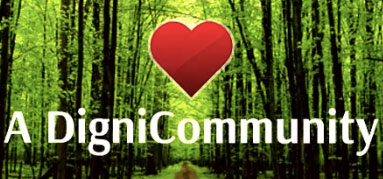
A big thank you to all
music, movement, and poetry contributors
throughout the workshop!
Musical contributions
• David Yamada: What a Wonderful World (Text | Video)
• Ikhlaq Hussain: Love Letter 3 - Aaj Jaane Ki Zid Na Karo in Raag Yaman (recorded in Geneva on August 15, 2020)
• Die Gedanken sind frei / Thoughts are Unchained by the DignityNowHameln group (World Dignity Movement channel | HumanDHS channel)
• Andrea and Regina: Der Mond ist aufgegangen (Video of verse 1 on Day Two | Video of verse 2 on Day Three | Video of verse 1 + 2) Der Mond ist aufgegangen wurde 1790 vom Matthias Claudius als religiöses Abendlied geschrieben, vertont wurde es noch im selben Jahr vom Hofkapellmeister Johann A. P. Schulz. English: The moon has risen was written by Matthias Claudius in 1790 as a religious evening song, and it was set to music in the same year by the court conductor Johann A. P. Schulz.
• Hameln Sings (all vocal interludes brought together) (Video)
• Audrey Hurley: The Lord's Prayer (Audio recorded on November 20, 2020)
• Kathy Beckwith: Child of the Earth (Video on Day Three | Audio, recorded on November 5, 2020)
• George Wolfe: Native American Flute Improvisation (with Robert Willey playing the drum Video | Video pre-recorded August 30, 2020 | Video of another improvisation recorded on July 12, 2020 | see also George Wolfe's saxophone play at the 2014 workshop Video)
• Navanita Hridy Sings Hallelujah by Leonard Cohen (Video | Audio)
• Keri Lawson-Te Aho and Mr. Paikea Tamuera Ariki Sing Ko te Amorangi (Text | Video, recorded on December 9, 2020, in Aotearoa New Zealand)
• Keri Lawson-Te Aho and Mr. Paikea Tamuera Ariki Sing Whakataka te hau (Text | Video, recorded on December 9, 2020, in Aotearoa New Zealand)
• Dragvoll Music
• Christine de Michele Sings About the Black Community's Significance for Jazz Music on Day Two, in Honor of Tony Gaskew's Talk the Day Before (Video)
• Fred Ellis Sings So Long, See You Soon (Video 2020 | Video 2019)Movement
• Martha Eddy Offers a DigniStretch Activity on Day Two (Video | see also DigniCalm and DigniStretch activities pre-recorded on December 4, 2020)
As introduction, Martha Eddy suggests How to Be Alone
See also: Somatic Resources for Stressful Times | Global Water Dances Mission | Global Water Dances (GWD) YouTube Channel | Global Water Dance: Documentary, 3 minutes | Global Water Dance, 12 minutesMeditation
• Bhante Revata Dhamma: On Dignity (Video)
The videos further down were only shared during the workshop
• Bhante Revata Dhamma: The Nomad Monk (Videos recorded in 2020, brought together by Linda Hartling on December 3, 2020)
• Bhante Revata Dhamma: Poetry 2 (Video recorded on December 6, 2020)
• Bhante Revata Dhamma: Poetry 3 (Video recorded on December 6, 2020)Poetry
• Bonnie Selterman: Escaping Complicity — A Poem (Video | Pdf | Spoken recording on November 21, 2020)
• Gershon Mitchel: First Things First: A Universal Truth — A Poem (Spoken recording on December 4, 2020 | see also his "Message to the World" Video | his Note of Appreciation Video)
Participants (alphabetical according to the first names)
In the registration form, participants were warmly invited to reflect on the following question: What does dignity mean to you?
Many participants kindly offered their conceptualization of dignity and their responses are listed below. Furthermore, the relational nature of our dignity work is made visible by small personal "love letters" that honor the dignifying connectivity that forms the foundation of the global dignity fellowship.
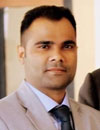 |
Abhishek Kumar Jain, Bhopal, India
|
|---|---|
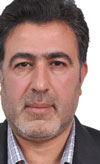 |
Amin Husnul, Pakistan, U.S.A.
|
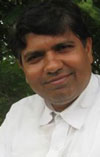 |
Ananta Kumar Giri, Chennai, Tamil Nadu, India
|
 |
Andrea Brenker-Pegesa, Weserbergland, Lower Saxony, Germany
|
Andrea Valente, Toronto, Canada
|
|
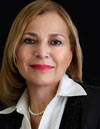 |
Ani Kalayjian, New York City
|
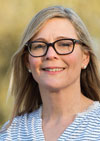 |
Anke Winchenbach, Guildford, England
|
 |
Anna Strout, Albuquerque, New Mexico
|
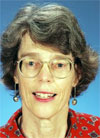 |
Anne Wyatt Brown, Baltimore, Maryland, U.S.A.
|
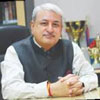 |
Anoop Swarup, Bhopal, India
|
 |
Antoinette "Nietta" Errante, Columbus, Ohio, U.S.A., and Mozambique
|
 |
"Archer" Natasha Archer, Oregon, U.S.A.
|
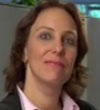 |
Ariel Lublin, New York City
|
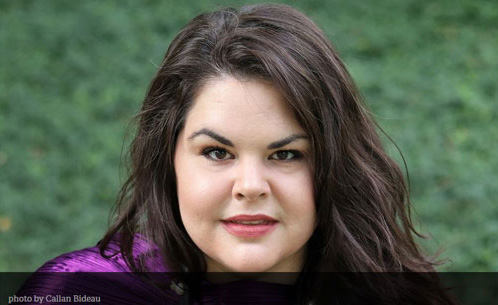 |
Audrey Hurley, New York City
|
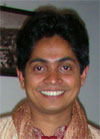 |
Azad Mohammad Abul Kalam, Dhaka, Bangladesh
|
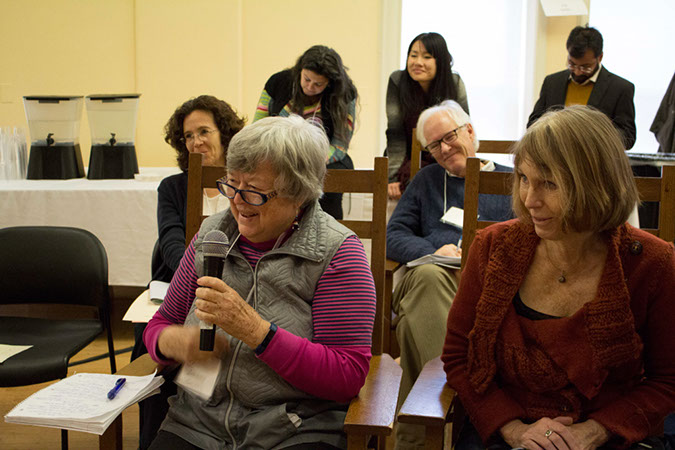 |
Barbara Barnes, New York City
|
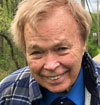 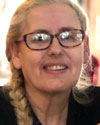 |
Bill and Joni Baird, Pennsylvania, U.S.A.
|
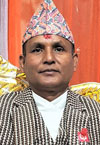 |
Bishnu Pathak, Kathmandu, Nepal
|
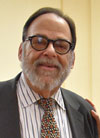 |
Bob Kaplan, Bronx, New York City
|
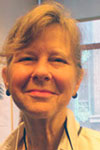 |
Bonnie Selterman, New York, U.S.A.
|
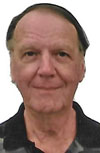 |
Brian Gerrard, Florida, U.S.A.
|
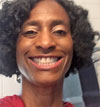 |
Camille Butterfield Elliott, Massachusetts, U.S.A.
|
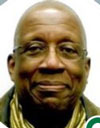 |
Carl Jennings, Derwood, Maryland, U.S.A.
|
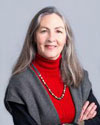 |
Carol Osler, Massachusetts, U.S.A.
|
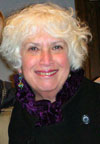 |
Carol Smaldino, Colorado, U.S.A., Italy
|
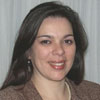 |
Catharina Carvalho, Brazil, U.S.A.
|
 |
Chaime Marcuello-Servós, Zaragoza, Spain
|
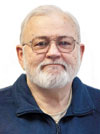 |
Charles Hayes, Alaska, U.S.A.
|
 |
Charlott Macek, New York City
|
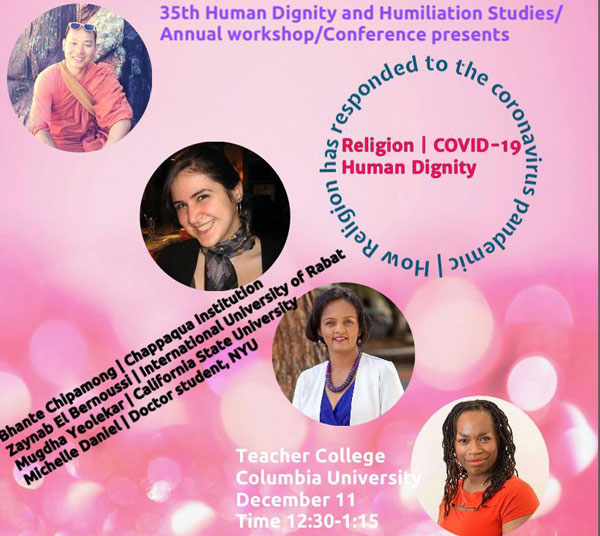 |
Chipamong (Chipa) Chowdhury, or Bhante Revata Dhamma (monk's name, known in the monastic communities), Nomad Monk
|
 |
Christine Lior Locher, Germany, U.S.A.
|
 |
Christine de Michele, North Carolina, U.S.A.
|
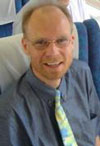 |
Christopher Pollmann, Metz, France
|
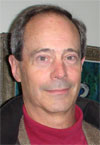 |
Clark McCauley, Wyoming, Pennsylvania, U.S.A.
|
 |
Claudia Lutschewitz, Cologne area, Germany
|
 |
• Claudia Thimm and Gisela Michalik, Hameln (Hamelin), Germany
|
Clement Niyukuri, Rwanda / Burundi |
|
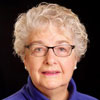 |
Connie Dawson, Washington, U.S.A.
|
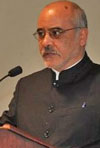 |
Crain Soudien, Cape Town, South Africa
|
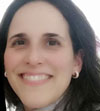 |
Cris Prade, Brazil, England
|
 |
Danielle Coon, New York City
|
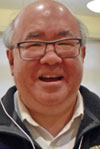 |
David Yamada, Boston, U.S.A.
|
 |
Eddy Setia, Medan, Sumatera Utara, Indonesia
|
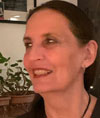 |
Elaine Meis, New York City
|
 |
Ella Nygård, Finland
|
 |
Emmanuel Ndahimana, Rwanda
|
 |
Eunice Avilés Faria, Massachusetts, New York, New Jersey, and Puerto Rico
|
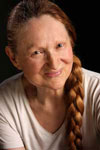 |
Evelin Lindner, Global
|
 |
Fatma Susan Tufan, Turkey, U.S.A.
|
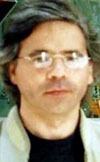 |
Francisco Cardoso, Vila Real, Portugal
|
Gabriela Hofmeyer, San Francisco, U.S.A.
|
|
 |
Gabriela Saab, São Paulo, Brazil, New York City
|
 |
Gay Rosenblum-Kumar, New York City
|
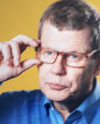 |
Georg Geckler, Hameln (Hamelin), Germany
|
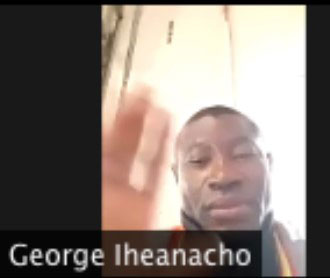 |
George Chidieber Iheanacho
|
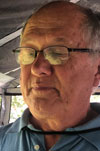 |
George Wolfe, Indiana, U.S.A.
|
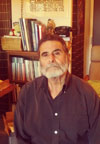 |
Gershon Mitchel, Pennsylvania, U.S.A.
|
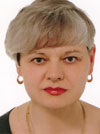 |
Gordana Jovanovic, Serbia, Global
|
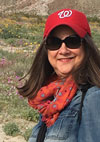 |
Grace Feuerverger, Toronto, Canada
|
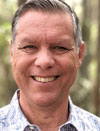 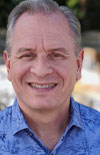 |
Harold Becker and John Goltz, Florida, U.S.A.
|
 |
Hayal Köksal, Istanbul, Turkey
|
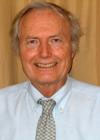 |
Peace Philosopher Howard Richards, Chile, South Africa, and California (Justine Richards)
|
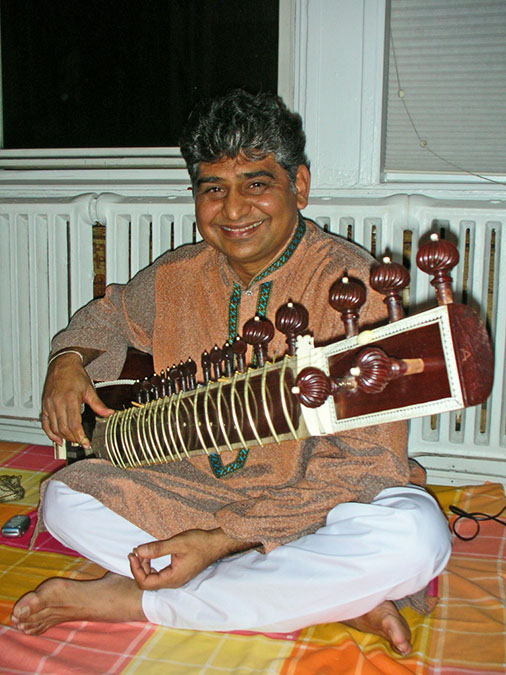 |
Ikhlaq Hussain
|
Isabel Barroso, Tarragona, Catalunya
|
|
 |
Jana Jakob, Sweden
|
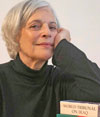 |
Janet Gerson, New York City
|
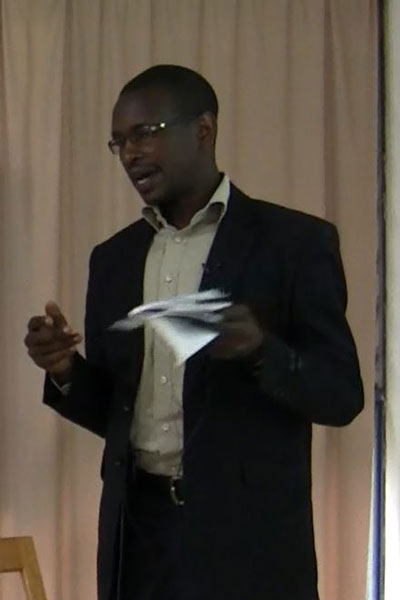 |
Jean d’Amour Dusengumuremyi, Rwanda
|
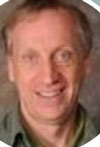 |
Jeffrey Mensendiek, U.S.A., Kobe, Japan
|
 |
Jennifer Lynne, Texas, U.S.A.
|
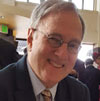 |
John Bilorusky, Berkeley, California, in the midst of the severe coronavirus pandemic
|
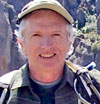 |
John Borst, California, U.S.A.
|
 |
John Carter, Ohio, U.S.A.
|
 |
Judit Révész, Hungary, New York City, Geneva, Switzerland
|
Kai Kunze, Lower Saxony, Germany
|
|
 |
Karen Ferraz, Brazil, Tennessee, U.S.A.
|
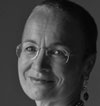 |
Karin Dremel, Colorado, U.S.A.
|
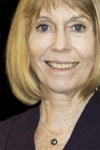 |
Katherine Stoessel, New York City
|
 |
Kathy Beckwith, Oregon, U.S.A.
|
 |
Kathy Orchen, Accord, New York
|
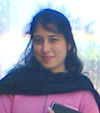 |
Katyayani Singh, Bhopal, India
|
 |
Keenan Powers, New York City
|
Kel Boyles, New York City
|
|
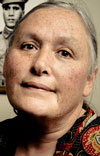 |
Keri Lawson-Te Aho, Aotearoa New Zealand
|
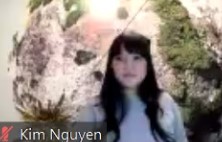 |
Kim Nguyen, New York City, France
|
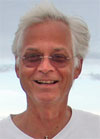 |
Leland R. Beaumont, Middletown, New Jersey, U.S.A.
|
 |
Linda Hartling, Oregon, principle convener of this workshop
|
Lindsay Lennertz, Albuquerque, New Mexico
|
|
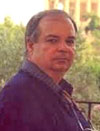 |
Lucien Xavier Lombardo, Virginia, U.S.A.
|
 |
Lyndon Harris and Maria Lund, North Carolina, U.S.A.
|
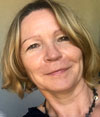 |
Maggie O'Neill, Ireland, England
|
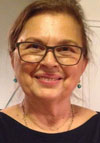 |
Mara Alagic, Bosnia and Herzegovina, Kansas, U.S.A.
|
 |
María Cristina Azcona, Buenos Aires, Argentina
|
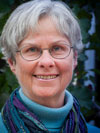 |
Marilyn Langlois, California, U.S.A.
|
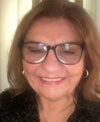 |
Marta Carlson, Illinois, U.S.A.
|
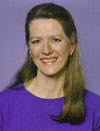 |
Martha Eddy, New York City
|
 |
Matthew Rich-Tolsma, The Netherlands, Czech Republic, South Africa
|
 |
Mauro Guilherme Pinheiro Koury, Recife, Brazil
|
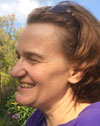 |
Mecke Nagel, Germany, Cortland, New York
|
Mehmoona Javad, Pakistan, Ireland
|
|
 |
Melinda Zalma, New York City
|
Melissa Baxter, Maryland, U.S.A.
|
|
Melvy Murguia, Los Angeles, Berkeley, California, U.S.A.
|
|
 |
Michael Boyer, Hameln (Hamelin), Germany
|
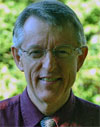 |
Michael F. Britton, New Jersey, U.S.A.
|
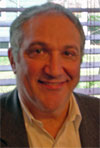 |
Michael B. Greene, New Jersey, U.S.A.
|
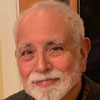 |
Michael Perlin, New York City, New Jersey, U.S.A.
|
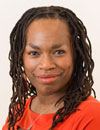 |
Michelle Daniel Jones, and her husband Reverend Darrell Daniel, Indianapolis, U.S.A.
|
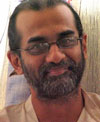 |
Milind Wani, Pune, India
|
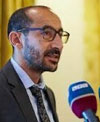 |
Mohammed Al-Qussari, Amman, Jordan
|
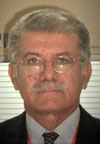 |
Moustafa Hedayah, Cairo, Egypt
|
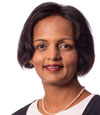 |
Mugdha Yeolekar, India, U.S.A.
|
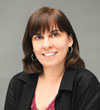 |
Muna Killingback, Boston
|
 |
Navanita Hridy, Jahangirnagar University, Bangladesh
|
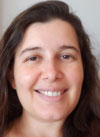 |
Natália Viana Brasil, João Pessoa, Paraíba, Brazil
|
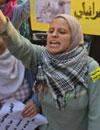 |
Noha Tarek, Alexandria, Egypt, Seattle, U.S.A.
|
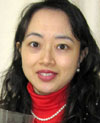 |
Noriko Ishihara, Tokyo, Japan
|
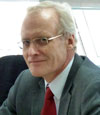 |
Olav Ofstad, Norway, India
|
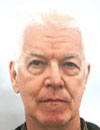 |
Peter Barus, Vermont, U.S.A.
|
 |
Peter Pollard, Massachusetts, U.S.A.
|
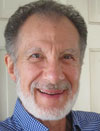 |
Phil Brown, New Jersey, Colorado, U.S.A.
|
 |
Pradeep N'Weerasinghe, Sri Lanka
|
 |
Qin Shao, China, Pennsylvania, U.S.A.
|
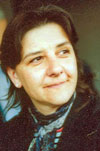 |
Rachel Aspögård, Sweden
|
 |
Rangga Radityaputra, South Sulawesi, Southeast Asia, Indonesia
|
 |
Regina, Hameln, Germany
|
 |
Rita Anita Linger, North Carolina, U.S.A.
|
Robin Edgar, South Carolina, U.S.A.
|
|
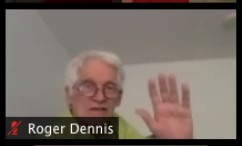 |
Roger Dennis, New York area
|
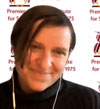 |
Rosa Reinikainen, Sebastopol, CA, U.S.A.
|
 |
Samuel Muderhwa, Bukavo, Congo
|
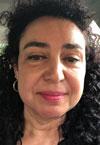 |
Sandra Eliyahu, Great Neck, New York
|
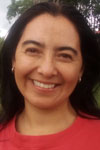 |
Sandra Liliana Rojas Molina, Bogota, Colombia
|
 |
Seema Shekhawat, India, U.S.A.
|
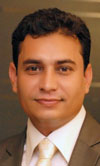 |
Sharif Shaikh Awais Anwar, Pakistan
|
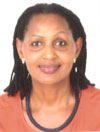 |
Spes Gaudence Manirakiza, Canada
|
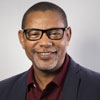 |
Stanley Henkeman, Cape Town, South Africa
|
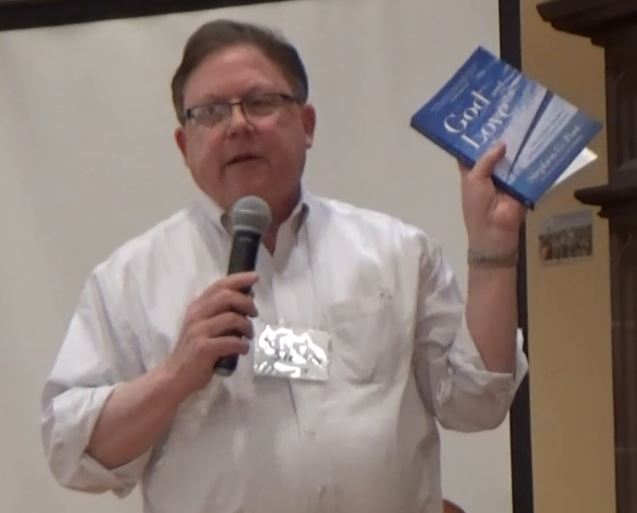 |
Stephen Post, Stony Brook, New York
|
 |
Susan Misra, Bronx, New York City
|
Susanna Pearce, Ithaca, New York
|
|
Suzanne Rienks, Southern Cross University, Australia
|
|
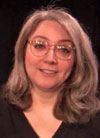 |
Talia Werber, New York City
|
 |
Terry Dean Beitzel, Harrisonburg, Virginia, U.S.A.
|
Thea Torek
|
|
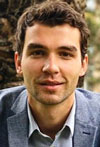 |
Tomas Kral, Czechia, Addis Abeba, Ethiopia
|
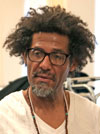 |
Tony Gaskew, Pittsburgh, New York City
|
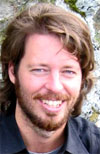 |
Vegar Jordanger, Trondheim, Norway
|
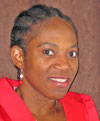 |
Veronica Fynn Bruey, global, Seattle, WA
|
 |
Vidya Jain, Jaipur, India
|
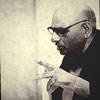 |
Vinod Verma, Delhi, India
|
Virginia Hankins, Los Angeles, California, U.S.A.
|
|
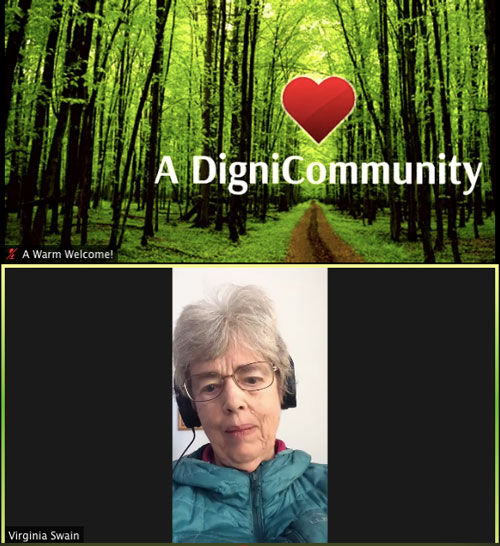 |
Virginia Swain, Worcester, MA, U.S.A.
|
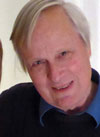 |
Volker Berghahn, New York City
|
 |
Wael Mohamed, Egypt and Malaysia
|
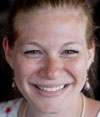 |
Whitney Hess, Cape Elizabeth, Maine, U.S.A.
|
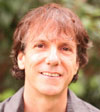 |
Will Hall, Oakland, CA, U.S.A.
|
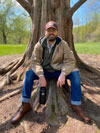 |
Zachary L. Beaudoin, Columbia University, NYC, Rockville, Maryland, U.S.A.
|
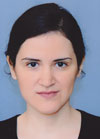 |
Zaynab El Bernoussi, Z, Morocco"Dignity: compassion." |
Rationale, Methodology, and Frame
Rationale
This workshop series is part of a larger process. Each workshop is much more than a stand-alone event. It is part of the overall mission of our global dignity movement, which is to create an atmosphere in which people can meet on a plane of mutual friendship and equality in dignity. The workshop invites its participants to experiment with creating a new culture of global cohesion and togetherness, and to nurture a global family of dignity, a family that truly acts like a good family should act and protects and cherishes our unity in diversity. The workshop invites into enlarging and transcending concepts such private versus public, or family/friends/good neighbors versus "bad neighbors" (or even "enemies"), as well as concepts such as life mission versus job/hobby..
Given the current context of the field of international conflict, the impact of emotions on conflict has become one of the most important questions worldwide. However, there are only scattered publications in the research and applied literature that would address issues on conflict and emotion directly, as well as their relations and their impact on public policy.
The first one-day meeting was held at Teachers College, Columbia University, in 2002, convened by Morton Deutsch personally, the first two-day workshop in 2004, hosted by the Columbia University's Conflict Resolution Network (CU-CRN), since 2009, AC4 stepped into the place of CU-CRN), with special help from SIPA – Center for International Conflict Resolution (CICR) and The Morton Deutsch International Center for Cooperation and Conflict Resolution (MD-ICCCR)
Since 2004, CICR on behalf of CU-CRN and later AC4, together with the Human Dignity and Humiliation Studies (HumanDHS) network and, since 2011, also the World Dignity University (WDU) initiative, invites selected groups of scholars, counselors, conflict resolution practitioners, mediators, and teachers among other professions for a two-day workshop every year to explore issues of conflict and emotions and its application to actual negotiations and diplomacy. The aim is to particularly probe the role of the notion of humiliation from the two different angles of conflict and emotion.
The workshops are envisaged as a learning community gathering, interactive and highly participatory. The purpose is to create an open space to identify and sharpen our understanding of the discourse and debate on emotion and conflict and the role that might, or might not be played by humiliation within this field. We hope to be able to continue this effort in follow-up workshops in the future.
We see humiliation as entry point into broader analysis and not as "single interest scholarship." We are aware that most participants focus on other aspects than humiliation in their work and have not thought about humiliation much, or even at all. We do not expect anybody to do so beforehand. We encourage that everybody comes with his/her background, his/her theoretical concepts and tools, and that we, during the conference, reflect together. We invite everybody to use their focus and give a thought to whether the notion of humiliation could be enriching, or not, and if yes, in what way. We warmly invite diverging and dissenting views.How We Go About
In our conferences, we choose a dialogical methodology that stresses interaction and participation, because we wish to create an atmosphere of openness and respectful inquiry through "dignity dialogues" or dignilogues and, when appropriate, the use of Open Space Technology. We believe that notions such as dignity and respect for equal dignity are important not only for conflict resolution, but also for conferences such as our workshops. The name Human Dignity and Humiliation Studies attempts to express this. We wish to strive for consistency between what we think are important values for conflict resolution, and the way we conduct our work and our conferences.
We believe in "waging good conflict" (Jean Baker Miller). We believe that diverging opinions and perspectives need to be expressed and not avoided, because diversity enriches. However, diversity only enriches if embedded into mutual connection and appreciation. If not harnessed lovingly and caringly, diversity has the potential to divide, create hostility, and foster hatred and even violence. In the spirit of our vision, we, the HumanDHS network, wish therefore to avoid the latter and foster an atmosphere of common ground and mutually caring connections as a space for the safe expression of even the deepest differences and disagreements, and the toughest questions of humiliation, trauma, and injustice.
Every dignilogue is being opened by brief remarks by each participant to present their entry points into the inquiry. In order to facilitate feedback, we wish to make available a brief synopsis of 1 to 4 pages, preferably with references, from each participant, prior to the workshop through this site so that all participants can meet virtually before meeting in person. Longer papers are welcome as well both prior and subsequent to our workshops, not least for the envisaged publications of the results of our conferences. Please notify us, if you wish to submit any of your papers also as a book chapter or as a journal article in our Journal of Human Dignity and Humiliation Studies.
All participants are warmly invited to send in their papers as soon as they can. We would be grateful if you could help us by formatting your contribution as follows:
1. Title: bold and in a large font.
2. The author's name under the title, proceeded by a copyright sign.
3. In case the text is longer than one page: A footer for the name of the author, and a header for the title and the page number (in Word, you can use View > Header and Footer > Page Setup > Different first page, etc.).
4. Spacing: Single-spacing.
5. For non-natural English speakers who need support to make a text readable, please let us know and we try to find help.
5. The final Word document needs to be transformed into a Pdf file (use, for example, convert.neevia.com), and given a name. Please use your family name, and then identify the conference, in case of the 2008 NY workshop, this would read as follows: "FamilynameNY08meeting."
6. Please send us both you Word and Pdf files. Thank you!
Peace Linguist Francisco Gomes de Matos commented on this format as follows (May 2, 2012): "It enhances RELATIONAL DIGNITY. Everyone will make the most of such dignifyingly used time! A great humanizing, interactive format: a little bit of MONOlogue, followed by much DIALOGUE, will help create DIGNILOGUE."Frame
by Linda M. Hartling, Ph.D., Director of Human Dignity and Humiliation Studies (until 2008 Associate Director of the Jean Baker Miller Training Institute at Wellesley College in Boston, USA)
In our conferences we aim at creating a humiliation-free, collaborative learning environment characterized by mutual respect, mutual empathy, and openness to difference. The perspective of "appreciative enquiry" is a useful frame of our work. Our HumanDHS efforts are not just about the work we do together, but also about HOW WE WORK TOGETHER. At appropriate points during our conferences, for example at the end of each day, we take a moment to reflect on the practices observed that contributed to an appreciative/humiliation-free learning experience.
It is important to emphasize that an appreciative approach is not about expecting people to agree. In fact, differences of opinion enrich the conversation and deepen people's understanding of ideas. This could be conceptualized as "waging good conflict" (Jean Baker Miller), which means practicing radical respect for differences and being open to a variety of perspectives and engaging others without contempt or rankism. As we have seen in many fields, contempt and rankism drain energy away from the important work that needs to be done. Most people only know "conflict" as a form of war within a win/lose frame. "Waging good conflict," on the other side, is about being empathic and respectful, making room for authenticity, creating clarity, and growth.
Please see also the following background material, mainly created by Linda Hartling:
• Dignilogue Tips and Dynamic Dignilogue List, created on October 10, 2015, for the 2015 Workshop on Transforming Humiliation and Violent Conflict, in New York City, December 3 – 4, 2015.
• Dignilogue: An Introduction to Dignity + Dialogue, created on 31th May 2015 for the 2015 Kigali Conference
• Greetings to All (short version), created on 16h April 2013 for the 2013 South Africa Conference
• Greetings to All (long version), created on 16h April 2013 for the 2013 South Africa Conference
• Welcome to Everybody, created on 12th August 2012 for the 2012 Norway Conference
• Our Open Space Dignilogue Format, created on 12th August 2012 for the 2012 Norway Conference
• A Summary of Our Dignilogue Format for you to download
• An Appreciative Frame: Beginning a Dialogue on Human Dignity and Humiliation, written by Linda Hartling in 2005
• Appreciative Facilitation: Hints for Dignilogue Moderators, written by Judith Thompson in February 2006 to support the moderators of our workshops
• Buddhist Teachings on Right Speech, kindly provided to us by Thomas Daffern in 2006, relating to our quest for appreciative enquiry, caring and being
• Please see also the videos on our Appreciative Frame, created by Linda Hartling:
- Linda Hartling Introduces the Appreciative Frame of the Workshop (2019)
- Appreciative Frame, by Linda Hartling on December 8, 2016, at the 2016 Workshop on Transforming Humiliation and Violent Conflict, in New York City, December 8 – 9, 2016.
- Appreciative Enquiry 4, a video that was recorded on May 27, 2015, in Portland, Oregon, USA, by Linda Hartling, for the 25th Annual Conference of Human Dignity and Humiliation Studies, in Kigali, Rwanda, 2nd - 5th June 2015.
- Our Appreciative Frame 3, a video created in December 2014 (see also Pdf), for the 2014 Workshop on Transforming Humiliation and Violent Conflict, in New York City, December 4–5, 2014.
- Appreciative Enquiry 2, a video that was uploaded onto YouTube on August 11, 2012, in preparation of the 19th Annual Conference of Human Dignity and Humiliation Studies, 27th-30th August 2012, in Oslo, Norway.
- Appreciative Enquiry 1, a video that was recorded on October 30, 2011, in Portland, Oregon, USA, by Evelin Lindner, for the World Dignity University initiative.
List of Conveners
Honorary Convener 2003 – 2017: Morton Deutsch (February 4, 1920 – March 13, 2017), E. L. Thorndike Professor Emeritus of Psychology and Education, and Director Emeritus of The Morton Deutsch International Center for Cooperation and Conflict Resolution (MD-ICCCR), Teachers College, Columbia University
Morton Deutsch has been one of the world's most respected scholars and the founder of The Morton Deutsch International Center for Cooperation and Conflict Resolution (MD-ICCCR). MD-ICCCR was part of the Columbia University Conflict Resolution Network (CU-CRN), and since 2009 co-founded the Advanced Consortium on Cooperation, Conflict, and Complexity (AC4). Professor Deutsch has been widely honored for his scientific contributions involving research on cooperation and competition, social justice, group dynamics, and conflict resolution. He has published extensively and is well known for his pioneering studies in intergroup relations, social conformity, and the social psychology of justice. His books include: Interracial Housing (1951); Theories in Social Psychology (1965); The Resolution of Conflict (1973); Distributive Justice (1985); and The Handbook of Conflict Resolution: Theory and Practice (2000, 2nd edition 2006). Please note, in particular, Morton Deutsch's pledge titled Imagine a Global Human Community and its progress.
Morton Deutsch has been a Member of the HumanDHS Global Advisory Board since the inception of our dignity work in 2001, and, in 2014, he accepted, "with delight," our invitation to be our HumanDHS Board of Directors Honorary Lifetime Member. Morton Deutsch has also been the first recipient of the HumanDHS Lifetime Commitment Award, which he received at the 2009 Workshop on Transforming Humiliation and Violent Conflict. Furthermore, Morton Deutsch has been a Founding Member of the World Dignity University initiative.
Morton Deutsch founded this workshop series in 2003 and has been its Honorary Convener until his passing in 2017. We will honor his memory by conducting this workshop also in the future. The first "Annual Round Table of Human Dignity and Humiliation Studies" (as we called it then) was convened by Morton Deutsch at the MC-ICCCR on July 7, 2003, with Peter T. Coleman, Beth Fisher-Yoshida, Janet Gerson, Andrea Bartoli, Michelle Fine, and Susan Opotow as participants.
We wish to give special thanks to Peter Coleman, Beth Fisher-Yoshida, and Janet Gerson for their ongoing substantive support for our dignity work since 2001. Andrea Bartoli inspired this workshop series and helped design it in 2003. He was at that time the Director of the Center for International Conflict Resolution (CICR) at the School of International and Public Affairs, Columbia University, and Chairman of the Columbia University Conflict Resolution Network (CU-CRN). Andrea Bartoli is a Member of the HumanDHS Global Advisory Board since its inception. Also his successor, Aldo Civico, kindly supported this workshop, as did his successor, Jean-Marie Guéhenno, who became the President of the International Crisis Group in 2014. We wish to give special thanks to all three for their kind support. Since 2015, CIRC is dormant and the Arnold A. Saltzman Institute of War and Peace Studies (SIWPS) at the School of International and Public Affairs offers courses in specialization in conflict resolution (ICR Concentration).
Linda M. Hartling, Ph.D., Social Psychologist, organizer of the HumanDHS conferences, in support of the local conveners
Linda M. Hartling, Ph.D., is the recipient of the 2015 Human Dignity (Half!) Lifetime Commitment Award.
She is the Director of Human Dignity and Humiliation Studies (HumanDHS) and contributes to the leadership and development of workshops, conferences, Dignity Press publications, and the World Dignity University initiative. She works in daily collaboration with HumanDHS Founding President Evelin Lindner and is the orchestrator and key creator of the Dignity Letter. She is also a member of the HumanDHS Global Advisory Board, HumanDHS Global Core Team, HumanDHS Global Coordinating Team, HumanDHS Research Team, and HumanDHS Education Team.
Linda Hartling's husband Richard Slaven, formerly Brandeis University, Massachusetts, U.S.A., is the Director of HumanDHS Dignifunding. Richard Slaven is a Member of the Board of Directors of HumanDHS, he is a member of the HumanDHS Global Advisory Board and a Member of the HumanDHS Planning Committee. He is the recipient of the 2014 HumanDHS Lifetime Commitment Award.
Prior to the founding of HumanDHS, Linda Hartling was the Associate Director the Jean Baker Miller Training Institute (JBMTI) at the Stone Center, which was part of the Wellesley Centers for Women at Wellesley College in Massachusetts. She worked closely with Jean Baker Miller, MD, and other colleagues on the development of Relational-Cultural Theory. She holds a doctoral degree in clinical/community psychology and she developed the first scale to assess the internal experience of humiliation in 1996, which has been translated into many languages. In addition, she has published papers and chapters on resilience, substance abuse prevention, shame and humiliation, relational practice in the workplace, and Relational-Cultural Theory. [read more]
Linda Hartling kindly co-edited this book, wrote the Foreword and the final chapter:
"Moving Beyond Humiliation: A Relational Conceptualization of Human Rights." In Human Dignity: Practices, Discourses, and Transformations: Essays on Dignity Studies in Honor of Evelin G. Lindner. Edited by Chipamong Chowdhury, Michael Britton, and Linda Hartling. Chapter 15. Lake Oswego, OR: Dignity Press, 2019.
Please see also:
• Humiliation: Real Pain, A Pathway to Violence, the draft of Linda's paper for Round Table 2 of our 2005 Workshop on Humiliation and Violent Conflict, Columbia University, New York City.
• Humiliation: Assessing the Impact of Derision, Degradation, and Debasement, first published in The Journal of Primary Prevention, 19(4): 259-278, co-authored with T. Luchetta, 1999.
• Shame and Humiliation: From Isolation to Relational Transformation, the Jean Baker Miller Training Institute (JBMIT), Wellesley Centers for Women, Wellesley College No. 88, Wellesley, MA 02481, co-authored with Wendy Rosen, Maureen Walker, Judith V. Jordan, 2000.
• Humiliation and Assistance: Telling the Truth About Power, Telling a New Story, paper prepared for the 5th Annual Conference of Human Dignity and Humiliation Studies 'Beyond Humiliation: Encouraging Human Dignity in the Lives and Work of All People', in Berlin, 15th -17th September, 2005.
• Our Appreciative Frame, created on 12th August 2012 for our 2012 Norway Conference
• Our Open Space Dignilogue Format, created on August 12, 2012 for our 2012 Norway Conference
• Our Appreciative Frame, created in December 2014 for our 2014 New York Workshop (Pdf)
• Appreciative Enquiry 4, a video that was recorded on May 27, 2015, in Portland, Oregon, USA, by Linda Hartling, for the 25th Annual Conference of Human Dignity and Humiliation Studies, in Kigali, Rwanda, June 2 – 5, 2015.
• Appreciative Frame shared on December 8, 2016, at the 2016 Workshop on Transforming Humiliation and Violent Conflict, in New York City, December 8 – 9, 2016.
• Dignilogue Tips and Dynamic Dignilogue List, created by Linda Hartling on October 10, 2015, for the 2015 Workshop on Transforming Humiliation and Violent Conflict, in New York City, December 3 – 4, 2015.
• Mini-Documentary of the Annual Human Dignity and Humiliation Studies Workshop on Transforming Humiliation and Violent Conflict "The Globalization of Dignity," December 8 - 9, 2016
[read more]Evelin Gerda Lindner, Medical Doctor, Clinical and Social Psychologist, Ph.D. (Dr. med.), Ph.D. (Dr. psychol.), organizer of the HumanDHS conferences, in supporting of the local conveners
Evelin Gerda Lindner is the Founding President of the Human Dignity and Humiliation Studies (HumanDHS) network and initiator of the World Dignity University initiative. She is a transdisciplinary social scientist and humanist who holds two Ph.D.s, one in medicine and one in psychology. In 1996, she designed a research project on the concept of humiliation and its role in genocide and war. German history served as starting point. She is the recipient of the 2006 SBAP Award, the 2009 "Prisoner’s Testament" Peace Award, the 2014 HumanDHS Lifetime Commitment Award, and she has been nominated for the Nobel Peace Prize in 2015, 2016, and 2017. She is affiliated with the University of Oslo, Norway, with its Department of Psychology since 1997, periodically also with its Center for Gender Research and with its Norwegian Centre for Human Rights, furthermore, with Columbia University in New York since 2001, first with its Conflict Resolution Network (CU-CRN), which in 2009 was superseded by the Advanced Consortium on Cooperation, Conflict, and Complexity (AC4). She is also affiliated with the Maison des Sciences de l'Homme in Paris since 2001. Lindner is teaching globally, including in South East Asia, the Middle East, Australia, Africa, and other places globally. [read more]
Please see:
• Interview with Evelin Lindner - Challenges of our Time; Learning to Connect, December 8, 2016
• Mini-Documentary of the Annual Human Dignity and Humiliation Studies Workshop on Transforming Humiliation and Violent Conflict "The Globalization of Dignity," December 8 - 9, 2016
Participants in all NY workshops since 2003
Papers
All participants are warmly invited to send in full papers after the workshop.
Please notify us, if you wish to submit any of your papers also as a book chapter or as a journal article in our Journal of Human Dignity and Humiliation Studies.
Please see earlier submitted papers here:
• List of all Publications
• 2004 Workshop on Humiliation and Violent Conflict
• 2005 Workshop on Humiliation and Violent Conflict
• 2006 Workshop on Humiliation and Violent Conflict
• 2007 Workshop on Humiliation and Violent Conflict
• 2008 Workshop on Humiliation and Violent Conflict
• 2009 Workshop on Humiliation and Violent Conflict
• 2010 Workshop on Transforming Humiliation and Violent Conflict
• 2011 Workshop on Transforming Humiliation and Violent Conflict
• 2012 Workshop on Transforming Humiliation and Violent Conflict
• 2013 Workshop on Transforming Humiliation and Violent Conflict
• 2014 Workshop on Transforming Humiliation and Violent Conflict
• 2015 Workshop on Transforming Humiliation and Violent Conflict
• 2016 Workshop on Transforming Humiliation and Violent Conflict
• 2017 Workshop on Transforming Humiliation and Violent Conflict
• 2018 Workshop on Transforming Humiliation and Violent Conflict
• 2019 Workshop on Transforming Humiliation and Violent Conflict
Abstracts/Notes/Papers of 2020
Please see further down the papers/notes that participants send in prior to the workshop so that everybody can get acquainted with all others beforehand.
See here the work by:
Andrea Bartoli
Linda M. Hartling
Donald C. Klein
Victoria C. Fontan
Evelin G. LindnerMaggie O'Neill (2020)
Participation Arts and Social Action in Research (PASAR): Theatre Making and Walking in Research with Migrant Women, with Umut Erel, Ereni Kaptani, Tracey Reynolds and Maggie O’Neill, a short film by Marcia Chandra that shares the work and importantly the process (Video | Pdf comment | PASAR)
A contribution to the 2020 Workshop on Transforming Humiliation and Violent Conflict, Virtual, Columbia University, New York City, December 10 – 12, 2020.Maggie O'Neill (2020)
Walking Conversations with Maggie O’Neill, Arpad Szakaloczai, Ger Mullally, the Dingle Creativity and Innovation Hub and students and teachers from the Pobalscoil Chorca Dhuibhne (Video | Pdf comment)
A contribution to the 2020 Workshop on Transforming Humiliation and Violent Conflict, Virtual, Columbia University, New York City, December 10 – 12, 2020.Maggie O'Neill (2020)
Contribution to Dignilogue 1: Dignity Studies: Reimagining Learning in of World of Crises (Video) on Day One of the 2020 Workshop on Transforming Humiliation and Violent Conflict, Virtual, Columbia University, New York City, December 10 – 12, 2020.John Bilorusky (2020)
Contribution to Dignilogue 1: Dignity Studies: Reimagining Learning in of World of Crises (Pdf | Video) on Day One of the 2020 Workshop on Transforming Humiliation and Violent Conflict, Virtual, Columbia University, New York City, December 10 – 12, 2020.John Bilorusky (2020)
The Role of Transformative Action-and-Inquiry in Dignity Studies: Beyond Personalized Education with Curiosity and Commitment
Contribution to the 2020 Workshop on Transforming Humiliation and Violent Conflict, Virtual, Columbia University, New York City, December 10 – 12, 2020.Evelin Lindner (2020)
From Humiliation to Dignity: For a Future of Global Solidarity — From a Virus Pandemic to a Pandemic of Dignity: How Can We Escape Complicity with Institutionalized Humiliation? (Pdf | | Video December 12, 2020 | Version of 45 minutes pre-recorded on December 8, 2020 | Version of 48 minutes pre-recorded on December 6, 2020 | Version of 51 minutes pre-recorded on December 5, 2020, all in Germany)
This presentation was prepared for the 17th Workshop on Transforming Humiliation and Violent Conflict, titled "From a Virus Pandemic to a Pandemic of Dignity: How Can We Escape Complicity with Institutionalized Humiliation?" representing the 35th Annual HumanDHS Conference, December 10 – 12, 2020Bonnie Selterman (2020)
Escaping Complicity — A Poem (Video | Pdf | Spoken recording on November 21, 2020)
A contribution to the 2020 Workshop on Transforming Humiliation and Violent Conflict, Virtual, Columbia University, New York City, December 10 – 12, 2020.
Ideas for Dignilogue Topics
Your input is very welcome!
Ani Kalayjian kindly wrote (July 9, 2009):
Can we have a special section at the December Conference for highlighting both of these volumes, as well as the forgiveness book which will be in print on Aug 4th right at the APA Convention in Toronto. We could get some of the authors of the forgiveness book on a panel addressing: Slavery, denial, US prisoners, Sudan Genocide (these authors are living in this geographic area). We can also do the same another panel on the II volumes that you contributed in focusing on rituals to transform humiliation into empowerment.Karen Murphy kindly wrote (November 25, 2009):
I was thinking that CBS’ 60 Minutes Investigation of Congo’s Conflict Minerals on November 29, 2009 (see Enough's new Conflict Minerals web portal), would be a very interesting opportunity/resource for a roundtable, evening event, that is, using the 60 Minutes episode to raise awareness and to provide a context for discussion about the ways that we can make a difference in our daily lives to improve (even, in this case, save) the lives of others. Wishing you well and very grateful for you and your work--Karen
60 Minutes Episode on Conflict Minerals
If you have a cell phone in your pocket or a gold ring on your finger, you are directly linked to the deadliest war in the world. How is that possible? For over a century, the Democratic Republic of the Congo has been plagued by regional conflict and a deadly scramble for its vast natural resources. The conflict in eastern Congo today – the deadliest since World War II – is fueled in significant part by a multi-million dollar trade in minerals. Armed groups generate an estimated $180 million each year by trading four main minerals: the ores that produce the metals tin, tantalum, tungsten, and gold. This money enables the armed groups to purchase large numbers of weapons and continue their campaign of rape and brutal violence against civilians, with some of the worst abuses occurring in mining areas. After passing through traders, smelters, and component manufacturers, these materials are placed in jewelry and electronic devices, such as cell phones, portable music players, and computers, and sold in the United States. See also www.enoughproject.org/conflict-minerals.
Karen Murphy kindly wrote (January 28, 2009):
I am writing with an idea for the conference.
Have you had the chance to read Samantha Power's book Chasing the Flame? It's about Sergio Vieira de Mello and his work in various countries emerging from mass violence. Based on his life's work, Power proposes several key principles. One of them is dignity.
The book is the first product in a campaign that focuses on foreign policy. There is also a documentary (premiering this month at Sundance film festival) and a feature film by Terry George. In addition, there is a website that explores the key issues, www.chasingtheflame.org, and www.chasingtheflame.org/2008/08/the-principle-o.html (for an example of one of my blogs).
I was thinking that it would be so interesting to loop your work into this campaign. Perhaps members of the conference could read the book and then discuss it at a roundtable. You could then post blogs on the site or write in other forums.
It would be so interesting to bring your research into this conversation on foreign policy, nation building, national reconstruction and reconciliation, etc. As you might know, Samantha Power has played and continues to play a key role in Obama's foreign policy – looping your work into the website would be a way to bring it to a wider audience and a way to help shape this emerging conversation.
January 29, 2009:
I'm sure we can get copies of the book at a discounted price for conference attendees – and I'd love to think about how you might take the foreign policy lens and apply your scholarship – and perhaps then post as blogs for www.chasingtheflame.org, thus broadening their audience and yours. Best, KarenFloyd Webster Rudmin:
"Asymmetries in self-perceptions of being the humiliatee versus the humiliator"
"Archetypal humiliation in literature: A survey of English literature teachers"Annette Anderson-Engler:
"Constructing Narratives after Violent Conflict"
Annette kindly wrote on March 31, 2006: "I would like to discuss how individuals construct their narratives after traumatic experiences or event."Dharm P. S. Bhawuk:
"Theory, Method, and Practice of Humiliation Research"
This could also be a topic for our Open SpaceAna Ljubinkovic:
"Assistance and Humiliation"
Varda Mühlbauer:
"Humiliation/Dignity in the Workplace"
"Humiliation/Dignity in the Family"
Zahid Shahab Ahmed:
"Humiliation and Child Sexual Abuse"
Victoria C. Fontan:
"Terrorism and Humiliation" and
"Armed Conflict, Escalation and Humiliation"
Miriam Marton:
"Consequences of Humiliation"
Jörg Calliess:
"How to Prepare 'Non-Psychologists' (Human Rights Defenders, Peace Keepers, etc.) for Dealing with the Trauma of Humiliation in Victims"
Emmanuel Ndahimana:
"Ignorance and Humiliation"
Arie Nadler:
"Justice and Humiliation"
Alicia Cabezudo:
"Interlinking Peace Education and Humiliation Studies: A Bridge for Crossing Borders"
Material
